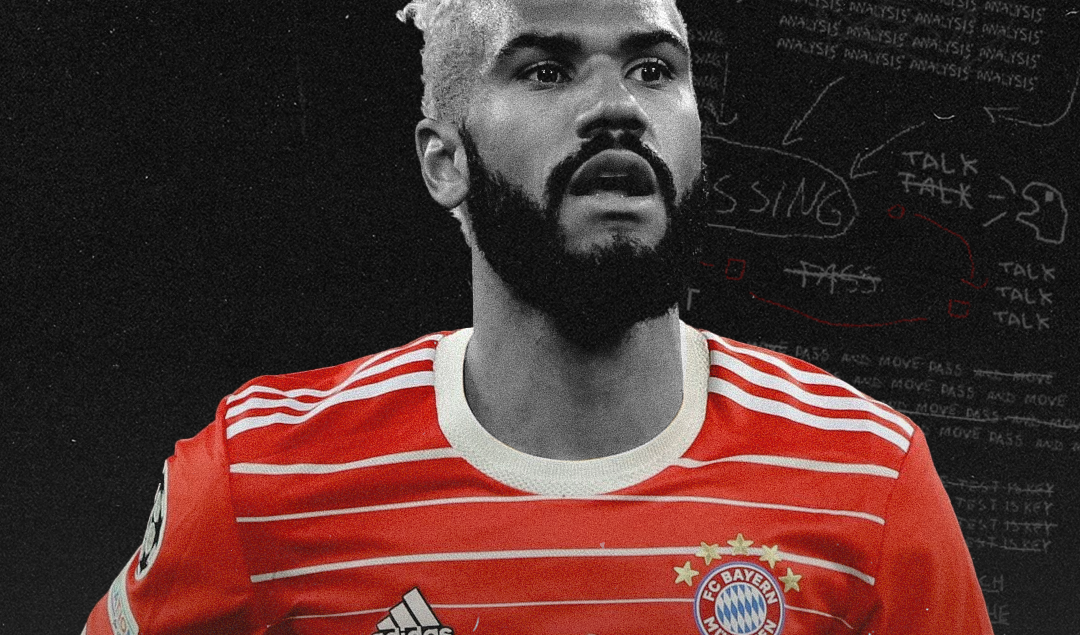Is Bayern Munich’s Dynasty Finally Coming to an End?
The Bundesliga heavyweight Bayern Munich wrestles with an uncharacteristic and somewhat unexpected downturn in form, on and off the pitch. This article aims to shed light on the portal of reasons responsible for the current struggles, from the managerial changes, club politics, players and the tactical evolution which has moved Bayern from being a model for European football in terms of success and general affairs to a current period of uncertainty.
Bayern Munich are currently without a win in all competitions in the last 3 games, losing back-to-back Bundesliga games since 2019 in the process against Opponents like Bochum whom they previously won 7-0 at the Allianz Arena earlier in the season. You start to wonder, ‘Is it bad luck?’, ‘Is it the coach?’, ‘Is it the players’?. These are a series of questions asked by Bayern fans and non-fans over the months. Let’s go down Memory Lane, down to the UEFA Champions League Final and what changed to be a sextuple-winning season in 2020.
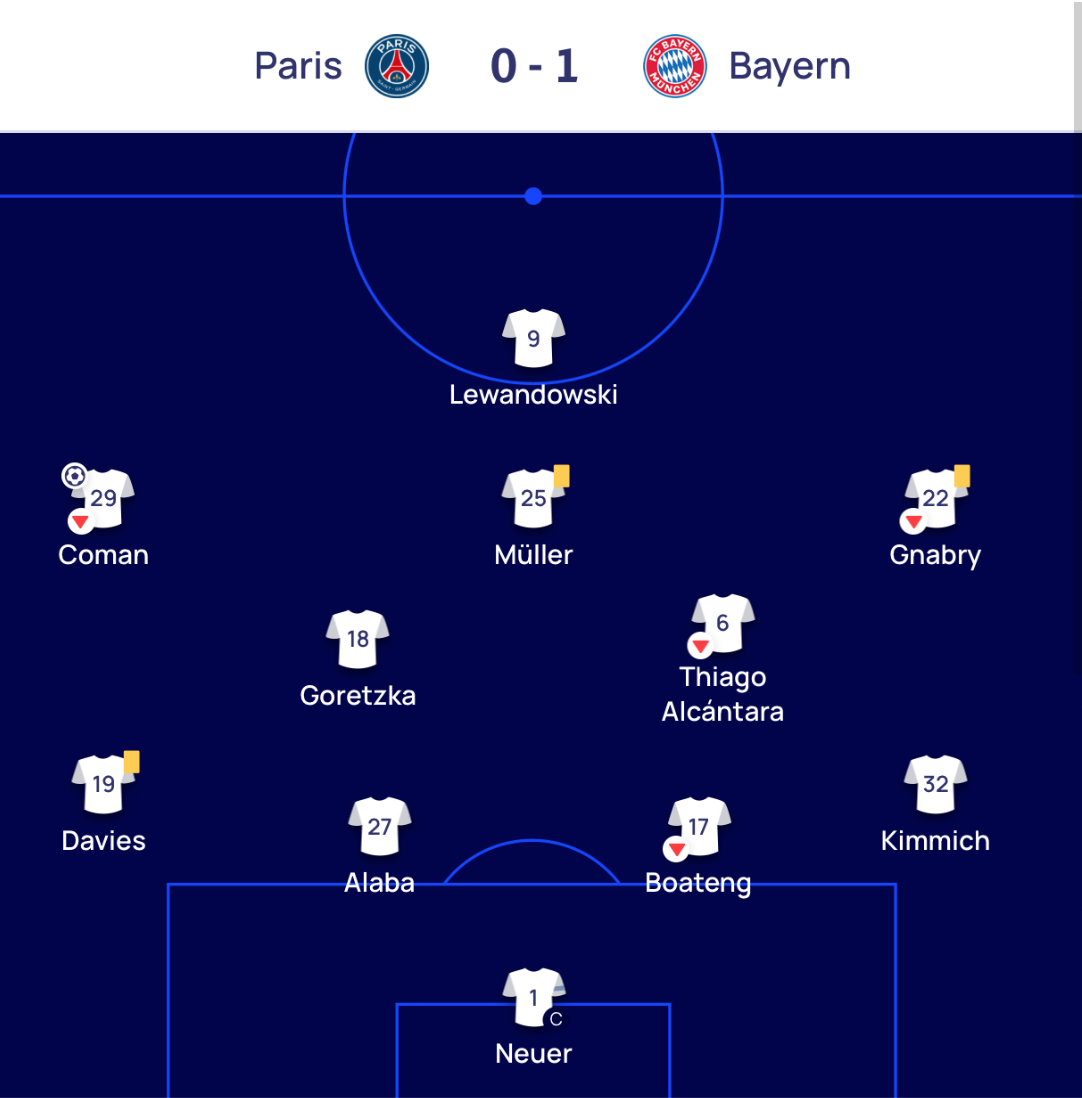
In the 2019/20 UEFA Champions League Final, 7 out of the 11(63%) starting players are still in the current Bayern Munich squad, it is reasonable enough to ask ‘These are the players good enough to win six trophies, is it the current coach’s fault then’? OR ‘Was the success back then heavily reliant on the coach’? Which takes us to the next scope to view: The managerial changes over the years.
The Managers
Hansi Flick was promoted following Niko Kovač’s dismissal in early November, and he would proceed to win a sextuple. Previously an assistant coach, Kovač was dismissed due to an embarrassing 5-1 defeat to Frankfurt in the Bundesliga. Not only that, Kovač was known for his inability to coach a defensive structure, conceding more goals in the league, 16, than Union Berlin, which was the side’s worst defensive record since Jürgen Klinsmann was coach in 2008.
Worthy to note, he had no support from the boardroom, as Bayern’s executives had little or no trust in him and constantly threw digs. An example is former chairman Karl-Heinz Rummenigge saying “I don’t think the performance we produced will bring us serious success this season” After an unconvincing 3-2 win against Olympiakos.”
Flick was originally appointed for two matches against Olympiakos and Borussia Dortmund in two different competitions, But two wins earned him the trust of the club and squad to continue until the winter break, which would start the beginning of a historical season at FC Bayern.
“I’m happy that FC Bayern is continuing to place trust in me as head coach,”. “I really enjoy working with the team and the coaching team” – Hansi Flick.
Hansi Flick
Flick inherited a squad used to playing a 4-3-3 and 4-2-3-1 formations under Kovač, and he decided to remain committed to a consistent 4-2-3-1 that offers an lopsided attacking shape and often involves several players advancing to attack in front of ball-playing defenders.
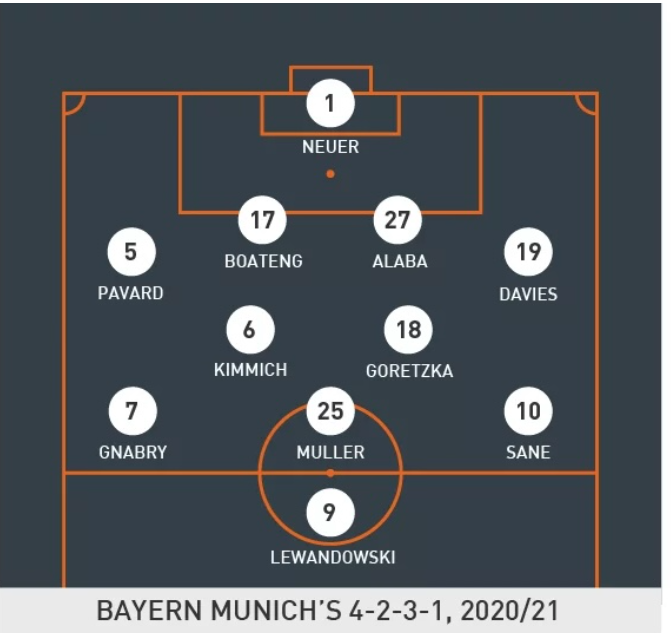
As a result of injuries, he trusted David Alaba in central defence and Alphonso Davies standing in at left-back. At times, experimented with Joshua Kimmich in defence alongside Benjamin Pavard, Alaba and Davies. In front of the defence, he favoured Joshua Kimmich and Leon Goretzka at the base of the midfield, sometimes inviting Pavard and Davies to advance from full-back.
Various build-up structures, an example is the 3-4-1-2 with Pavard and Davies creating overloads in midfield, with Thomas Müller and Robert Lewandowksi as the front 2, back 3 with a connected distance between them, Alaba and Jérôme Boateng as the wide defenders supplying passes in variety upward the pitch, also the width of the pitch covered by runners.
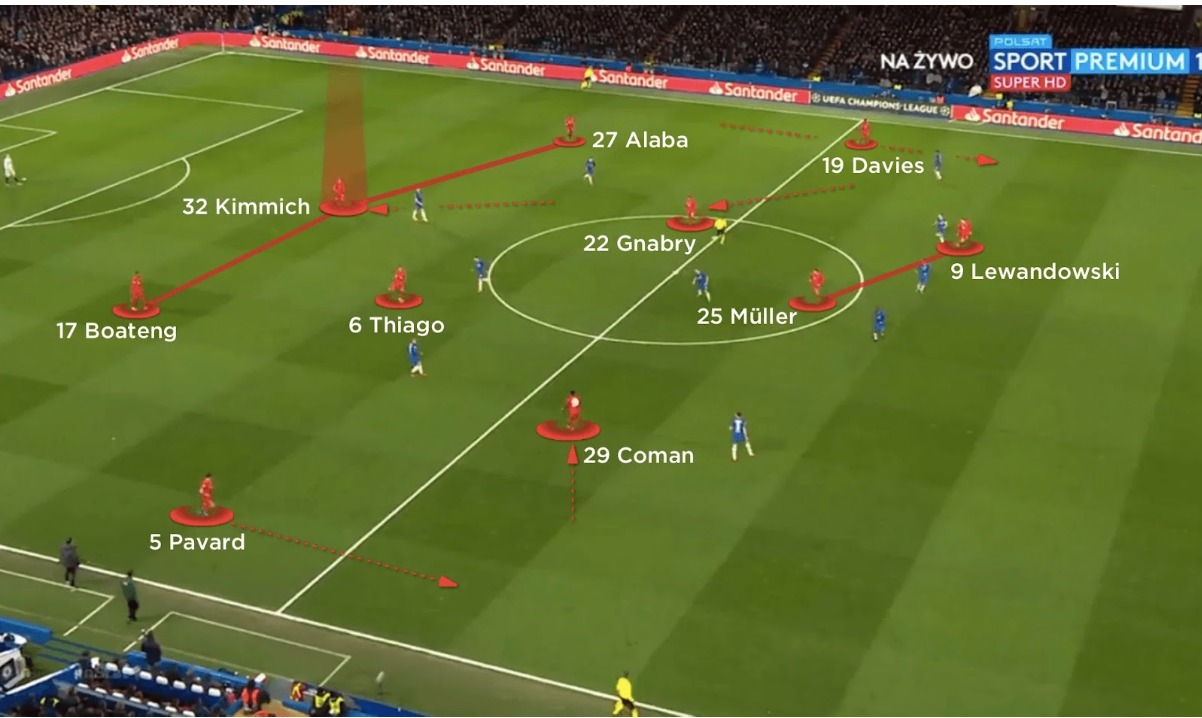
Flick is famously remembered for one of the biggest knockout games in Champions League history, against Barcelona which ended in a 8-2 trashing. This wouldn’t have come without the implementation of his tactical setup which he’s now synonymous with; ‘The High Line.’
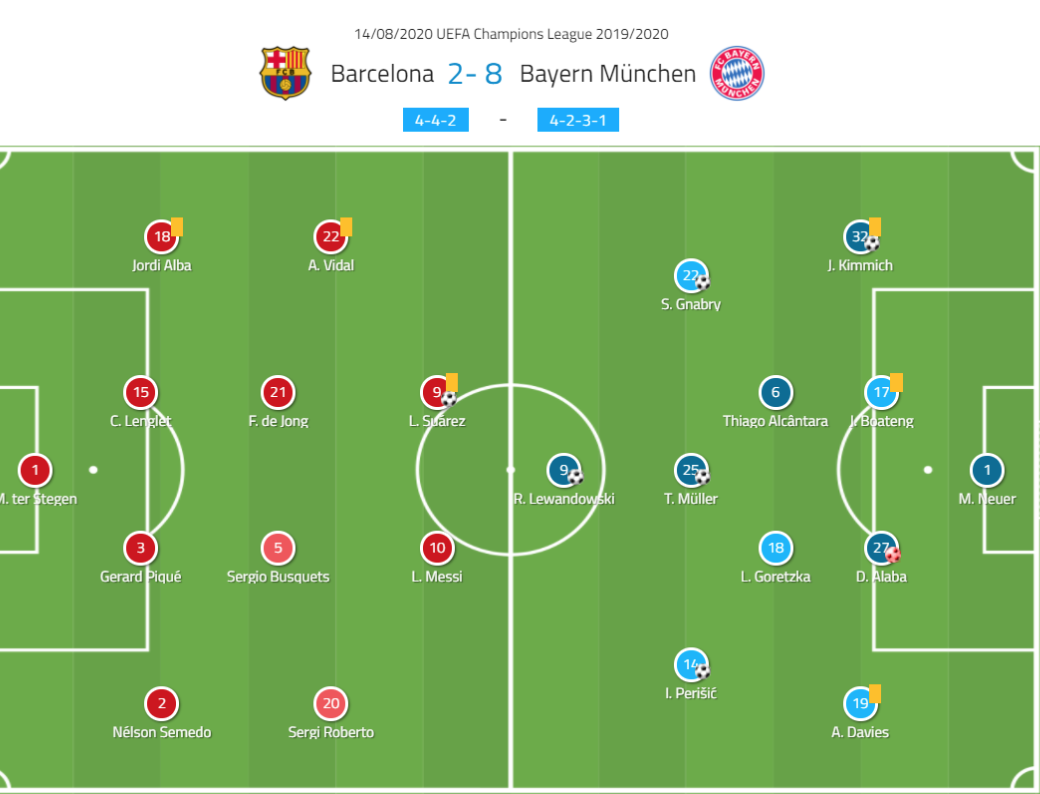
Hansi Flick opted to go with the same formation and line-up that the gaffer fielded in the 2nd leg of the Round of 16 against Chelsea. With the game presenting itself to Bayern, the team was able to exploit Barcelona’s 4-4-2 flat block with the front 2 of Lionel Messi and Luis Suárez failing to provide intensity in the press on Alaba, Bayern’s main ball carrier in defence, or block passing lanes. This made it easier for Bayern to progress from the first phase to second phase easily, mainly by direct passes into midfield, with the players constantly creating spaces for themselves.
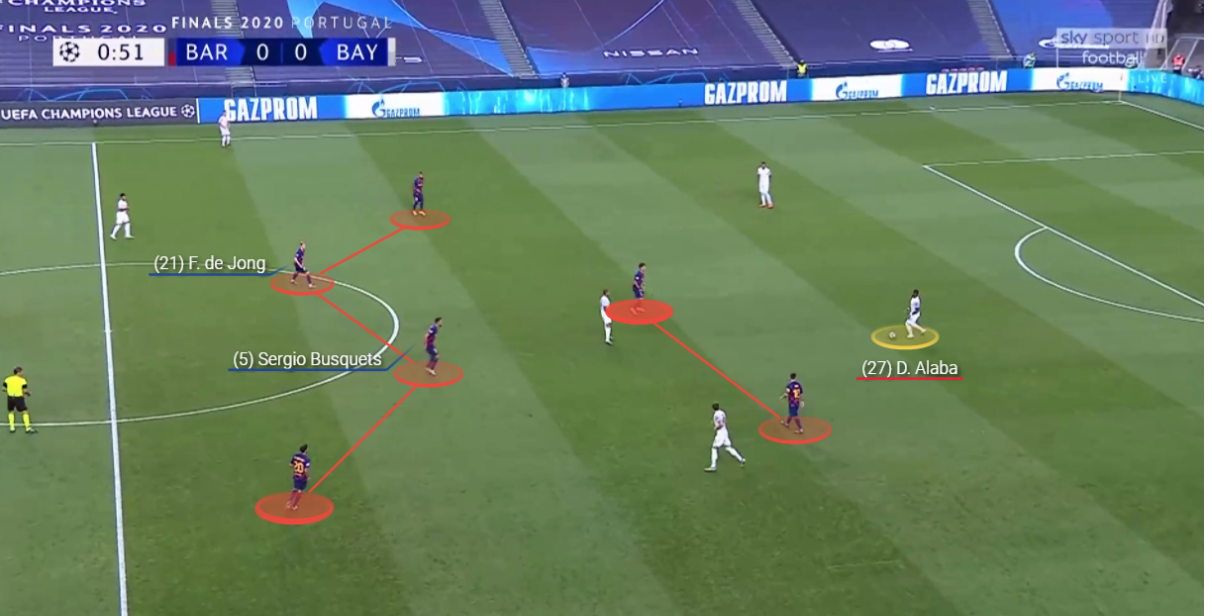
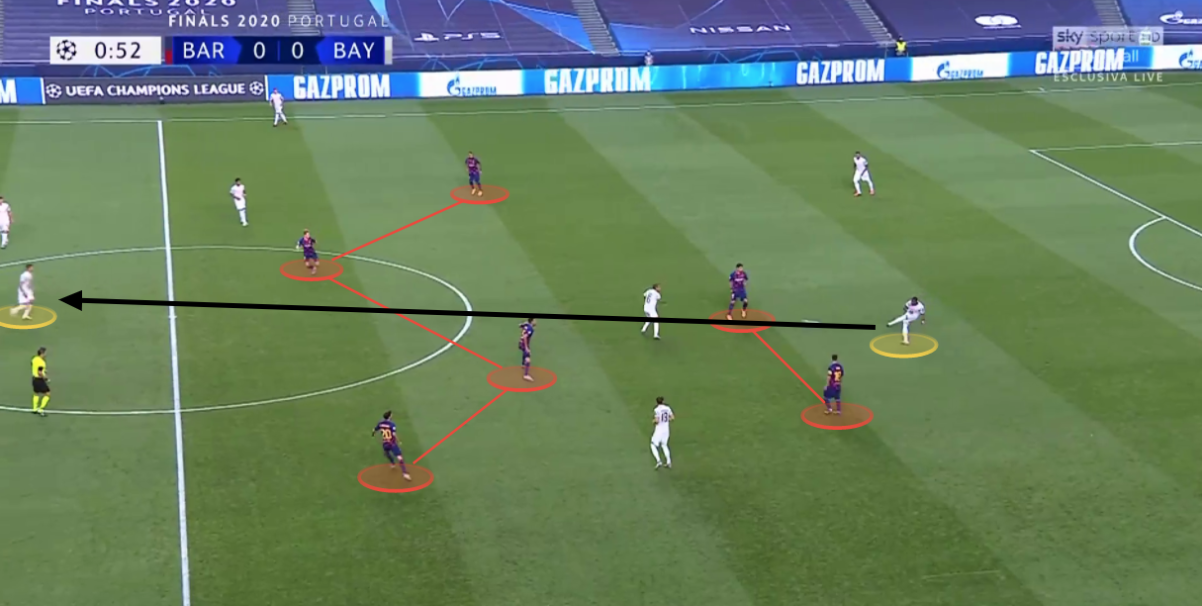
This wasn’t enough to have given the Bayern team a 8-2 win, the pressing structure was. Particularly in the first 35 minutes when the scoreline was already 4-1. With Bayern’s starting front six making 19 ball recoveries in the middle & attacking thirds. The Bavarians forced Barcelona’s defence to pass where they wanted and then kill Barcelona’s build-up with several pressing traps due to the starting positions of Bayern players deep inside Barcelona’s half when they build from goal.
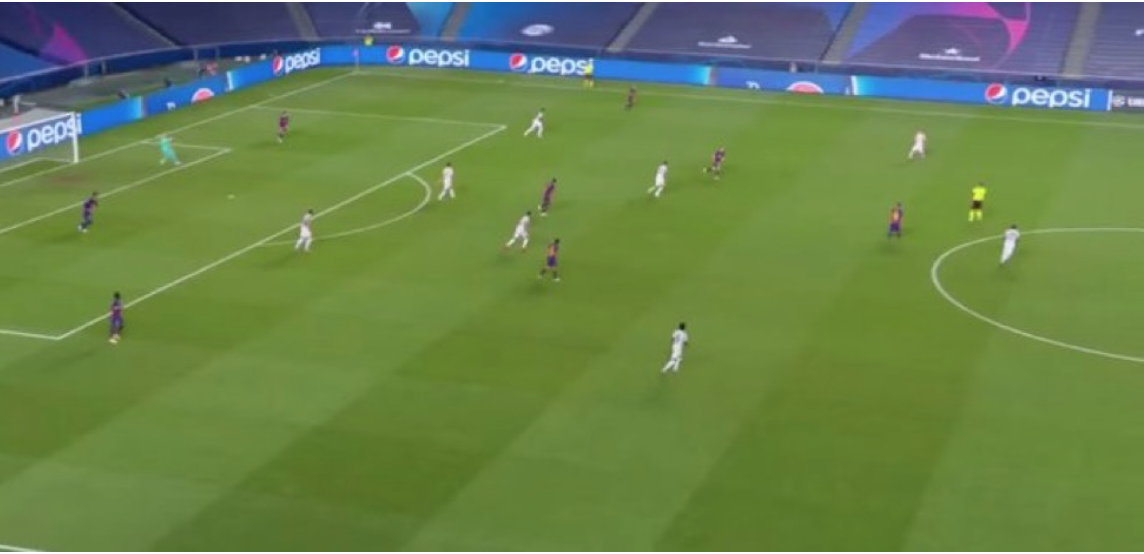
This attempts to sum up the whole game and highlight the key features to the 8-2 win, without taking us far away from the main point of the article. Moving on, after the Barcelona win Bayern also claimed a Victory over Lyon extending their flawless run in the Champions League. A win over PSG in the final with a goal scored by Kingsley Coman (A former PSG player) capped a historical run and a piece to the puzzle of other trophies to make it a sextuple. WHAT. A. RUN.
Out of curiosity as a non-Bayern supporter, you might want to ask yourself ‘Did Hansi Flick have it easy at Bayern’? Considering he spent less than 2 years at the club and asked the club to terminate his contract, the answer points to No. Let’s take a look at that.
Bayern Munich’s Champions League victory under Hansi Flick highlights a peculiar pattern in the last decade. Despite appointing renowned figures such as Carlo Ancelotti, Pep Guardiola, and Louis van Gaal, it’s the less heralded leaders who have consistently brought significant success to the club. Similar to Jupp Heynckes, the reliable figure chosen for two years between Louis van Gaal and Pep Guardiola’s reigns, Heynckes also secured a Champions League triumph during his tenure.
Louis van Gaal and Pep Guardiola
Van Gaal and Guardiola’s relatively short tenures at Bayern had apparent reasons for their departures. However, with Flick’s exit, it prompts a reevaluation of the club’s influence.
Bayer Leverkusen are:
-The only undefeated team in Europe
-The only team with a perfect UEFA Europa League record
-5 points clear in the Bundesliga with 13 matches left@princerequiem7 takes a look at Leverkusen’s stellar campaign under Xabi Alonso: https://t.co/pyrn2ddWDx pic.twitter.com/Tj71n6Jn9t
— Breaking The Lines (@BTLvid) February 16, 2024
When Van Gaal left Bayern, the team was in a significant struggle, facing challenges not witnessed for quite some time, despite winning the title and reaching the Champions League final the season before, the situation shouldn’t have ideally gotten bad so quickly. Van Gaal’s departure was partly attributed to clashes with Bayern Munich heavyweights Karl-Heinz Rummenigge and Uli Hoeness. Their frustration grew as he displayed an unwillingness to heed their counsel.
Van Gaal is popularly known for his flammable character and large ego on and off the pitch, only a few blamed Bayern for his departure as a result of these attributes but with the activities over the years, you start to wonder and ask ‘Are they to be blamed’? Van Gaal publicly claimed that Bayern’s ex-president Hoeness had ”influence on everything from the board down to the coach” and that affected his relationship with the players. This also can be traced in a straight line with the problems Flick faced. Again, the BAYERN BOARD.
FC Bayern handled Pep Guardiola’s departure remarkably well from a public relations standpoint. The amicable separation wasn’t entirely unexpected, considering the manager’s previous brief stint at Barcelona. Unlike Van Gaal, Guardiola didn’t clash with the club’s hierarchy, but he did have disagreements with the medical team during his tenure.
Guardiola achieved some incredible milestones with Bayern, winning the league with 7 games remaining in the season, which was the earliest a team became Champions in Bundesliga history, also went on to achieve the longest winning streak by a new manager with 28 wins. However, the make-and-break point of the relationship with the club was his failure to win the Champions League, in which Four members of staff quit after reportedly being blamed for a Champions League defeat in his first year.
The questions about Bayern’s ability to accommodate Guardiola stem from his apparent comfort at Manchester City and the duration of his tenure. After spending three years in Bavaria, he is now into his Eighth year at City, signing an extension for reasons publicly made that he had ‘unfinished business’ which is believed to be the UCL, the same reason he left Bayern Munich.
Hansi Flick and Hasan Salihamidžić
It is revealed there has been a long-running dispute with sporting director Hasan Salihamidžić over the decision to let senior players like Thiago Alcântara, Alaba and Boateng leave but was that all? No. They also had a contrasting view of things, especially in identifying players for potential transfers.
Examples of this can be seen in different scenarios; —Flick was a big fan of Timo Werner and spoke to him regularly on the phone – the club went with Salihamidžić’s choice Leroy Sané & then paid €50m to Man City, Hansi Flick also spoke to Mario Götze on the phone over a move in summer 2020. The board wasn’t convinced, Julian Draxler was also an option for Flick at some point, but not for the club.
For the right-back position, Flick wanted Ridle Baku before his move to Wolfsburg for €10m. Instead, the club signed Bouna Sarr for €8m. 6 months earlier, Flick’s other suggestion, Benjamin Henrichs on loan, was rejected. Álvaro Odriozola was signed instead, Other names that Hansi Flick suggested were Arne Maier, Max Meyer and Dodô. Flick was against signing Alexander Nübel – he wanted to keep backup goalkeeper Sven Ulreich.
Lastly, an important reason for the loss of confidence between Flick and Salihamidžić was the topic of Callum Hudson-Odoi and Sergiño Dest. Flick was told that both deals were done for 2020/21. In the end, both fell through and Douglas Costa and Sarr were signed instead. This is enough and beyond reasons to cause anonymity between the 2 individuals. The extent can also be identified when Volker Struth (Julian Nagelsmann’s agent) reveals that the first call from Hasan Salihamidžić came one day after Hansi Flick told him he wants to leave at the end of the season (the day after the CL elimination against PSG).
Raphael Guerreiro: What to Expect From Bayern’s Portuguese Arrival
The tension between Hansi Flick and Hasan Salihamidžić can be dated back to January 2020 shortly after the former’s promotion to head coach. Flick had publicly called for transfers, which Salihamidžić didn’t like and was surprised by the “public squad planning”.
Hansi Flick never wanted a power struggle or a clash with Hasan Salihamidžić. For him it was always clear that he had no chance, he never said: either him or me. The team chose a side in the conflict with Hasan Salihamidžić, It was Hansi Flick’s side.. Manuel Neuer & Thomas Müller especially were disappointed that the club didn’t manage to moderate the conflict in a better way, key figures like Lothar Matthäus also sided quite clearly with Hansi Flick and stated: ‘I think that Hansi is more important than Brazzo for the success of this club’ [Bild]
Hansi Flick and Bayern Munich officially announced the mutual agreement to terminate the contract on 27th of April, 2021, with Julian Nagelsmann confirmed to be his replacement.
Julian Nagelsmann
Bayern president Herbert Hainer told the club’s official website: “Julian Nagelsmann stands for a new generation of trainers. “Despite his young age, he has had an impressive career. We are convinced that with Julian Nagelsmann we will build on the great successes of the past few years.
Nagelsmann’s time at Bayern was predicted to be the start of a new era at Bayern, a young coach with a brilliant tactical mind, passionate about the culture and general relationships on and off the pitch, and a relentless pursuit of success. Taking the reins from Hansi Flick, Nagelsmann faced high expectations at one of Europe’s football powerhouses; Bayern Munich. In an interview, he revealed less emphasis would be put on tactics and match preparations on the opponents because he realised it is vitally important to trust individual characters at Bayern.
Remember the flick and Brazzo’s dispute? Well, there’s a report that goes thus: “Unlike Hansi Flick, Julian Nagelsmann can count on the backing and support of Hasan Salihamidžić regarding transfer plans. Nagelsmann has already suggested that the squad depth has to be strengthened [SPORTBILD]” But did he get the support? We’ll see
In his first season, Nagelsmann often used a 4-2-3-1 built on the double pivot of Joshua Kimmich and Leon Goretzka with Thomas Müller as the number 10 behind Robert Lewandowski which is similar to Flick’s setup, but unlike Flick, Nagelsmann selected wide players on the same wing as their stronger foot. Leroy Sané tended to play on the left, with Gnabry or Coman on the right.
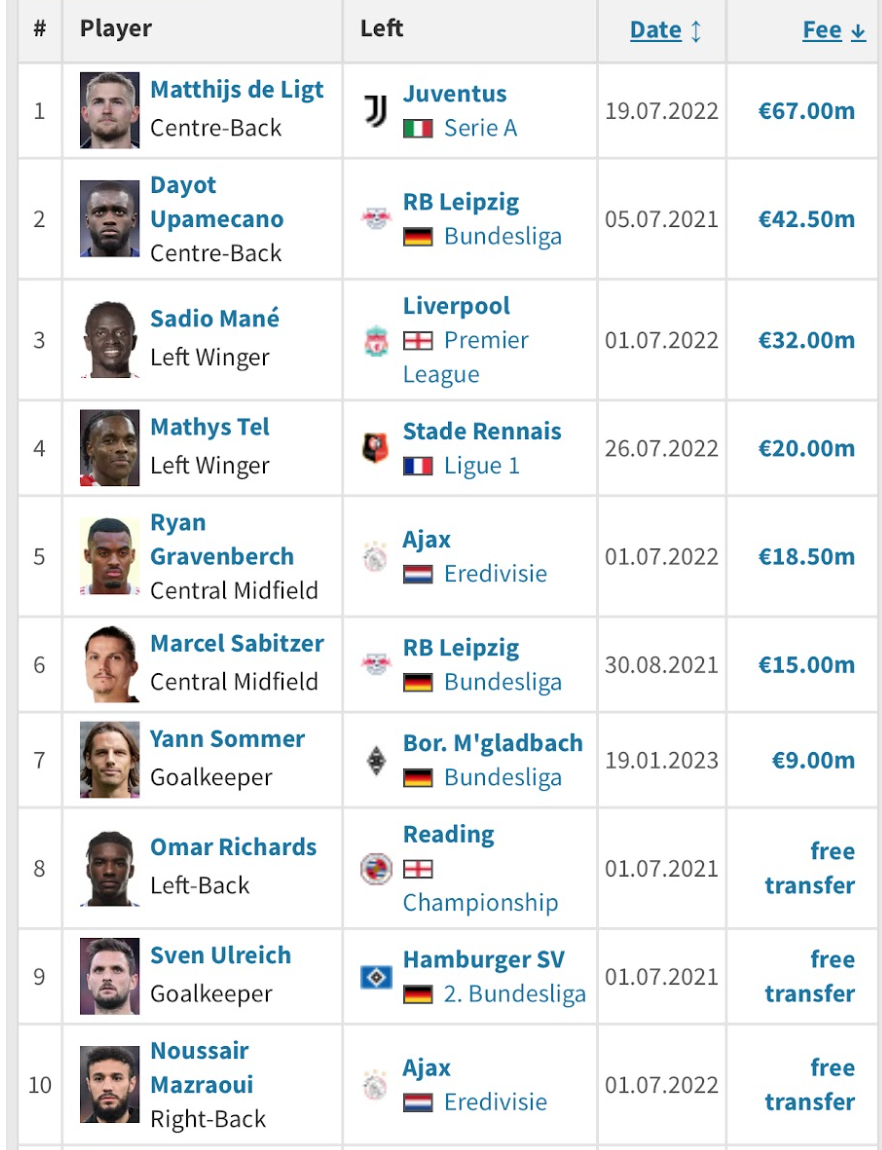
According to Transfermarkt, 12 players arrived under Nagelsmann during his time at Bayern; Big names like Sadio Mane, Matthijs de Ligt, Daley Blind, Joao Cancelo, Noussair Mazraoui and top youngsters like Mathys Tel, and Ryan Gravenberch. Without leaving out departures, the most significant one would be Robert Lewandowksi.
Having emerged as one of the best strikers in Europe since his arrival in 2014, the Polish international left under Julian Nagelsmann in July 2022, leaving him with a massive dilemma in terms of replacing a world-class forward who was a legend not just on the pitch, but a key figure in the dressing room as well.
Nagelsmann’s tactical flexibility was evident in this period, as seen by the deployment of various formations to adapt to opponents and personnel availability, although his preference for the 3-2-5 shone through. A back three created by lopsided full-backs, Benjamin Pavard and Lucas Hernandez as wide centre-backs with Hernandez tasked to carry into space.
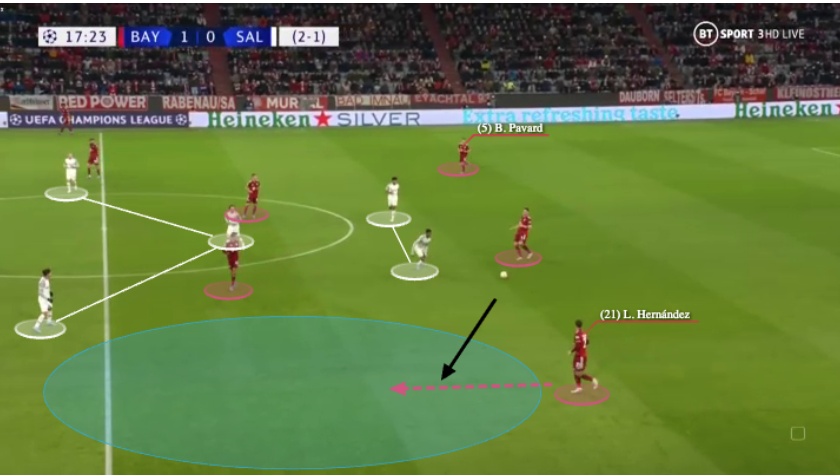
Evidence of his flexibility, especially to compensate for the absence of Robert Lewandowksi was when he used a 4-2-2-2 formation. A 2-4-2-2 in build-up for overloads in midfield, central combinations (Thomas Müller and Jamal Musiala as the #10s) and a front two of Sadio Mané and Serge Gnabry.
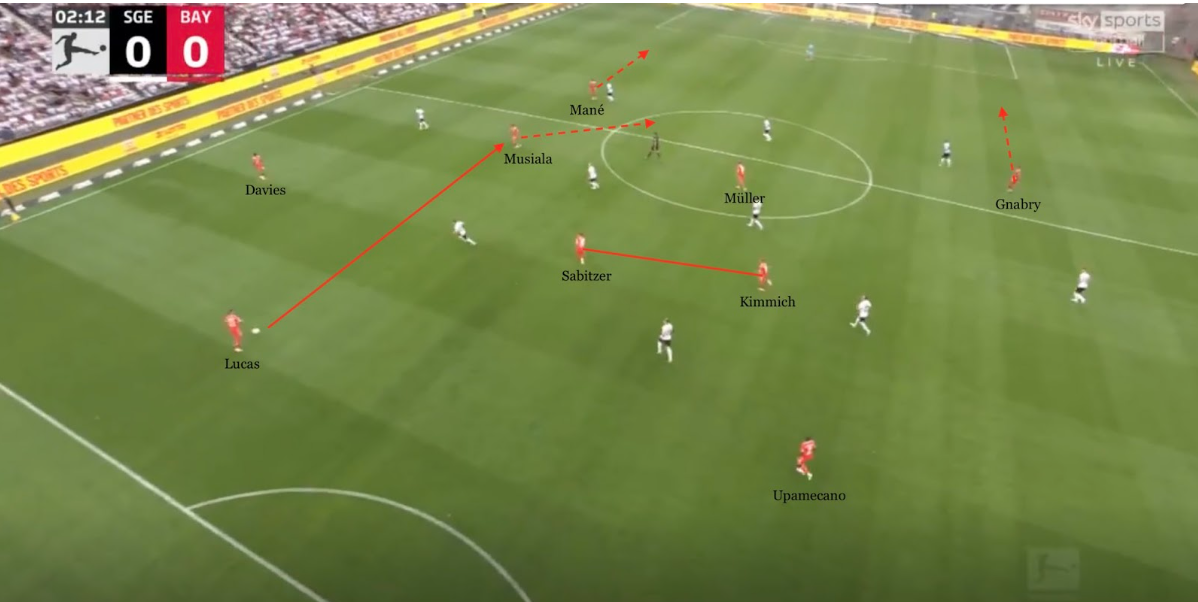
Fluid positional rotations, with a focus on minimal width – these tactics benefitted several attacking players. Nagelsmann turned Sane into a better central threat and also coached Musiala as an #8 for half-space dominance. With some of his tactical implementations out of the way, we could reason that wasn’t the top reason for his problems at Bayern. How could they? These tactics made him the youngest ever coach to win the Bundesliga, winning with 8 points ahead of second-placed Dortmund too.
The problems were more of internal relations in which there were several reports. “Things are getting tense between Julian Nagelsmann & Hasan Salihamidžić, which is currently a source of worries internally at the club. Some of the people in charge feel like they’re re-experiencing the beginning of the Flick/Salihamidžić tension from last year” [SPORTBILD]
“Nagelsmann has certain transfer requests that he informed the club about, meanwhile the supervisory board has allocated a budget with not much room for manoeuvre to Salihamidžić. Nagelsmann is frustrated with how ‘defensive’ the club is acting on the market” [SPORTBILD]
Bayern Munich and Inter Milan: 40 Years of World Cup Dominance
Examples: Nico Schlotterbeck (Nagelsmann had a call with him to convince him but the club took too long until the player decided for BVB) – Denis Zakaria (the club refused to pay €5m) – Amine Adli (Nagelsmann called the player, but Bayern took too long to make an offer) these looks identical to the problems Hansi Flick had with the club in terms of transfers, Doesn’t it?
Another factor was the frequent culture clash that happened between some of Nagelsmann’s actions and the club’s model. One of these was him gifting himself a holiday break during a tough time at the club following the loss in the club’s final game before the international break, and also several reports on Nagelsmann dating a club’s reporter.
These weren’t all, within the dressing room there were reposts of disagreement between the top-ranking players and claims that Nagelsmann created a ‘small empire’ at Säbener Straße consisting almost exclusively of his confidants: Benjamin Glück, Dino Toppmöller, Xaver Zembrod & Dr. Maximilian Pelka. Only Dr. Holger Broich is from the previous staff.
Nagelsmann’s ‘power monopoly’ came with some critical voices within the club’s entourage and particularly the club’s captain Manuel Neuer. Why Neuer? It was a publicly known topic Nagelsmann prioritized and talked more with Kimmich over Neuer. The players talked about that and it bothers Manuel Neuer.
It annoys Neuer that when there’s a problem, the coach calls Kimmich first, but that wasn’t all. Toni Taplovic; the goalkeeping coach was Neuer’s best friend, Toni and Julian didn’t get along well as internal discussions between them got leaked to Neuer and then the whole team. Tapalović’s role under Nagelsmann was more limited than it used to be under Flick. Julian Nagelsmann was the main driving force behind Tapalović’s dismissal. According to Bild, Neuer resented the fact that Nagelsmann was the reason his best friend got sacked.
Nagelsmann also pushed Neuer to be stripped of the captaincy as Kimmich was considered the designated next captain at the club & Nagelsmann’s first contact person in the team, which Neuer was critical of. While Kahn and Salihamidžić were supportive of Julian Nagelsmann following the events, Uli Hoeneß stands behind Manuel Neuer. Hoeneß is considered a father figure to Neuer since he pushed to sign him in 2011 despite the criticism of many fans.
Matthijs de Ligt: The Emergence of Bayern Munich’s New Defensive Rock
Robert Lewandowski also had problems with Nagelsmann and went public with his criticism, coupled with Manuel Neuer, two of Bayern’s biggest players in recent years who worked under several coaches. The ‘goalkeeping clique’ of Neuer, Ulreich & Tapalović was one of the reasons Nagelsmann’s time came to an end at Bayern. Neuer reclaimed his power back at the club.
Nagelsmann enjoyed a lot of benefits, too. The people in charge did everything they could to support him, including infrastructural changes and high-tech training material (video wall, a second isolated pitch for secret training, etc). No Bayern coach has had so many privileges since Guardiola. Nagelsmann was very closely involved in squad planning, taking part in transfer talks on his plan to the players over the phone, which helped convince the players. Noussair Mazraoui, for example, changed his mind after he had originally favored a move to FC Barcelona.
The club’s performance also played a role, Despite an amazing record in the Champions League, Bayern’s domestic form was heading downhill, losing a 9 lead points on the table with league rivals Dortmund on a blistering run, the Bayern bosses were worried about this and were critical of Nagelsmann’s systems and personnel choices.
Analyzing Jupp Heynckes’ Treble-Winning 2012/13 Bayern Munich Side
Bayern Munich as a club values total commitment, spirit, and willingness to keep putting your head up and be accountable for your actions, not forgetting the responsibilities too, all these were absent in Julian’s actions towards the end. The order from above was simple, it was for Nagelsmann not just to deliver titles, but to make a change and build a team for the future. The combination of these factors forced the arrival of the decision to sack Julian Nagelsmann during the season and replace with Thomas Tuchel who was open for a new challenge after his tenure ended at Chelsea.
Bayern’s Current Struggles with Thomas Tuchel
The appointment of Thomas Tuchel in March 2023 was rather a shocking decision, not only within the Bayern fan base but beyond it. But, it wasn’t a secret Bayern had wanted Tuchel as a coach for quite some time. The club is reported to have approached him to take over in 2018, but the move was stalled by Uli expressing concerns.
This time, the utmost reason for the board sacking Julian was that they believed the treble was in Danger ahead of their Champions league match against Manchester City and Tuchel was the man that could save it. How did that turn out?
Tuchel made it clear upon his arrival that he wanted to win all three trophies available to the Bavarians, but that quickly became an impossible task following a shock defeat in the German Cup. Bayern were beaten 2-1 by Freiburg and eliminated from the DFB-Pokal.
How Noussair Mazraoui Can Fit in at Julian Nagelsmann’s Bayern Munich
Following the defeat, Tuchel told Das Erste : “Freiburg scored two goals from two shots. I can’t remember another chance for them. We had good moments but always missed something, the last pass, the right decision, precision. They defended very deep and we couldn’t keep putting pressure on them.
Tuchel’s treble-winning dreams ended in his second game in charge, the first was however a show of magic as the team played one of the best they’ve under Tuchel to date, a 4-2 win over Dortmund. The Bayern Munich bosses hopped he could at least repeat the trick with his former club, winning the Champions League after taking over mid-season, which also ended with Tuchel overseeing the tie against Manchester City without a win in both legs.
In other words, Bayern were close to losing out on all three trophies, the only thing that saved that was Jamal Musiala’s last-minute goal against Cologne to secure the 11th straight title for the Bundesliga giants, which was Dortmund’s to lose as they drew 2-2 at home to Mainz on the final day.
Arguments have been raised by many in Tuchel’s defense that he had time to implement his ideas to a squad left for him by Julian Nagelsmann. Now, to the current 2023/24 season. Bayern Munich are 8 points behind league leaders Bayer Leverkusen and have a 1-goal deficit to chase against Lazio in the Champions League. This indicates Tuchel and Bayern are not having the best of seasons currently, with clear problems beyond results and on-field performances.
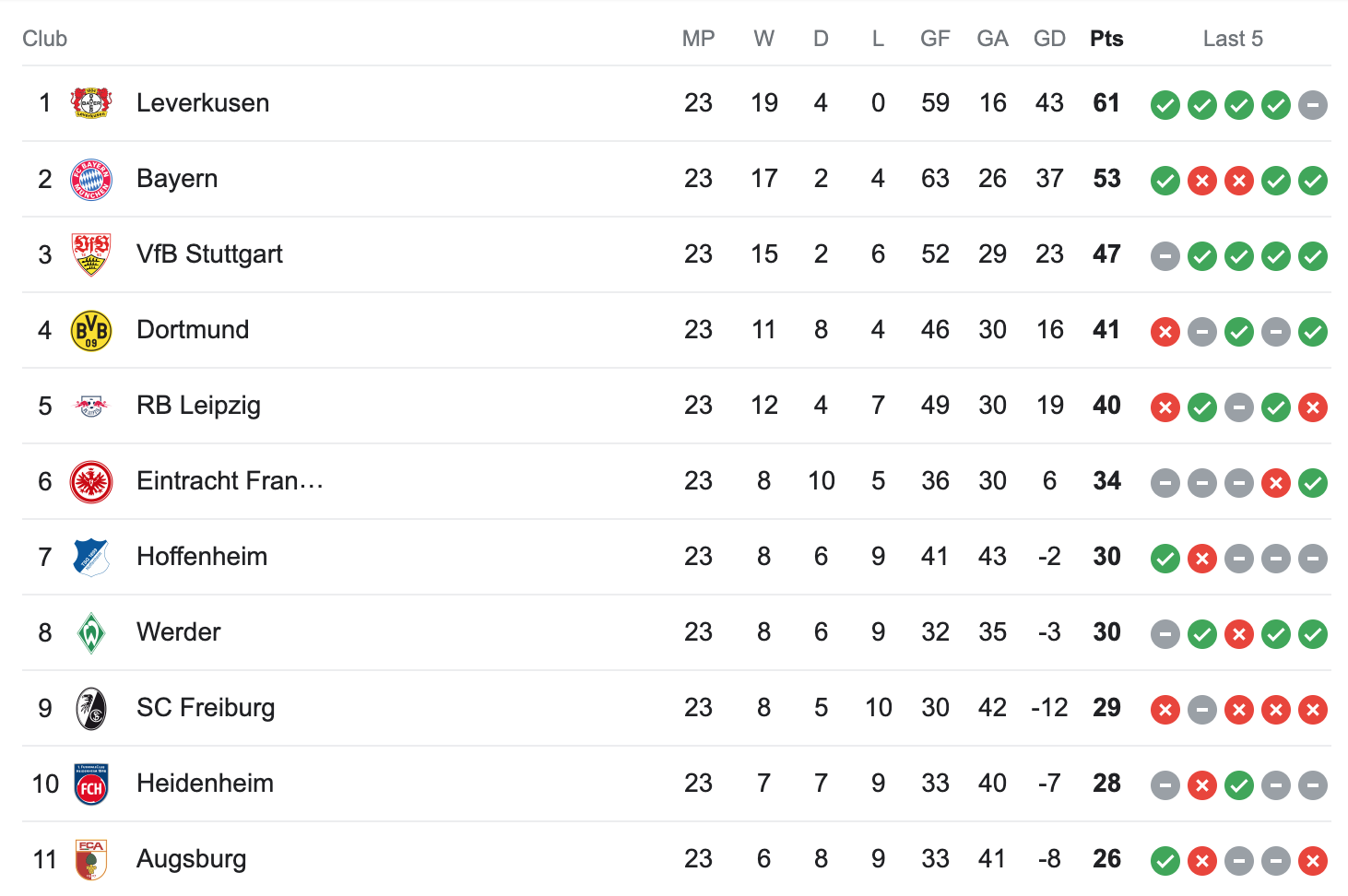
Tuchel hasn’t been able to strike up much of a bond with a majority of players in the dressing room after implicitly questioning their credentials on many occasions. “He’s undermined everybody,” a senior member of Bayern’s leadership told The Athletic, on condition of anonymity due to the volatility of the situation at the club [honigstein].
Let’s go back a little, to the time the club announced the signing of Harry Kane, Tottenham Hotspur’s record scorer with 280 goals in 435 appearances; becoming the Bundesliga champions’ record signing, eclipsing the 2019 deal for Lucas Hernandez. Kane signed a four-year deal and was registered in time for Bayern Munich vs RB Leipzig on Saturday evening; Kane came off the bench in the 64th minute to make his debut in a 3-0 defeat.
“FC Bayern president Herbert Hainer: “Welcome to Munich, Harry Kane! We’re very happy about this top-quality new arrival. The transfer required tenacity, bite and perseverance – my compliments to all those involved in these negotiations at FC Bayern, led by our CEO Jan-Christian Dreesen. Harry Kane will not only strengthen FC Bayern, but also be a real asset to the entire Bundesliga.”
Harry Kane: “I’m very happy to be a part of FC Bayern now. Bayern is one of the biggest clubs in the world, and I’ve always said that I want to compete and prove myself at the highest level during my career. This club is defined by its winning mentality – it feels very good to be here.”
Without a doubt, Harry Kane’s ability has been a key factor at the club, currently the highest goal scorer in the Bundesliga and Europe’s top 5 leagues with 25 goals (and counting) and 5 assists to the catalogue. Forming a key partnership with Leroy Sané. No other player has provided an assist-to-scorer combination in the Bundesliga this season than FC Bayern’s Leroy Sané, finding Kane 5 times.
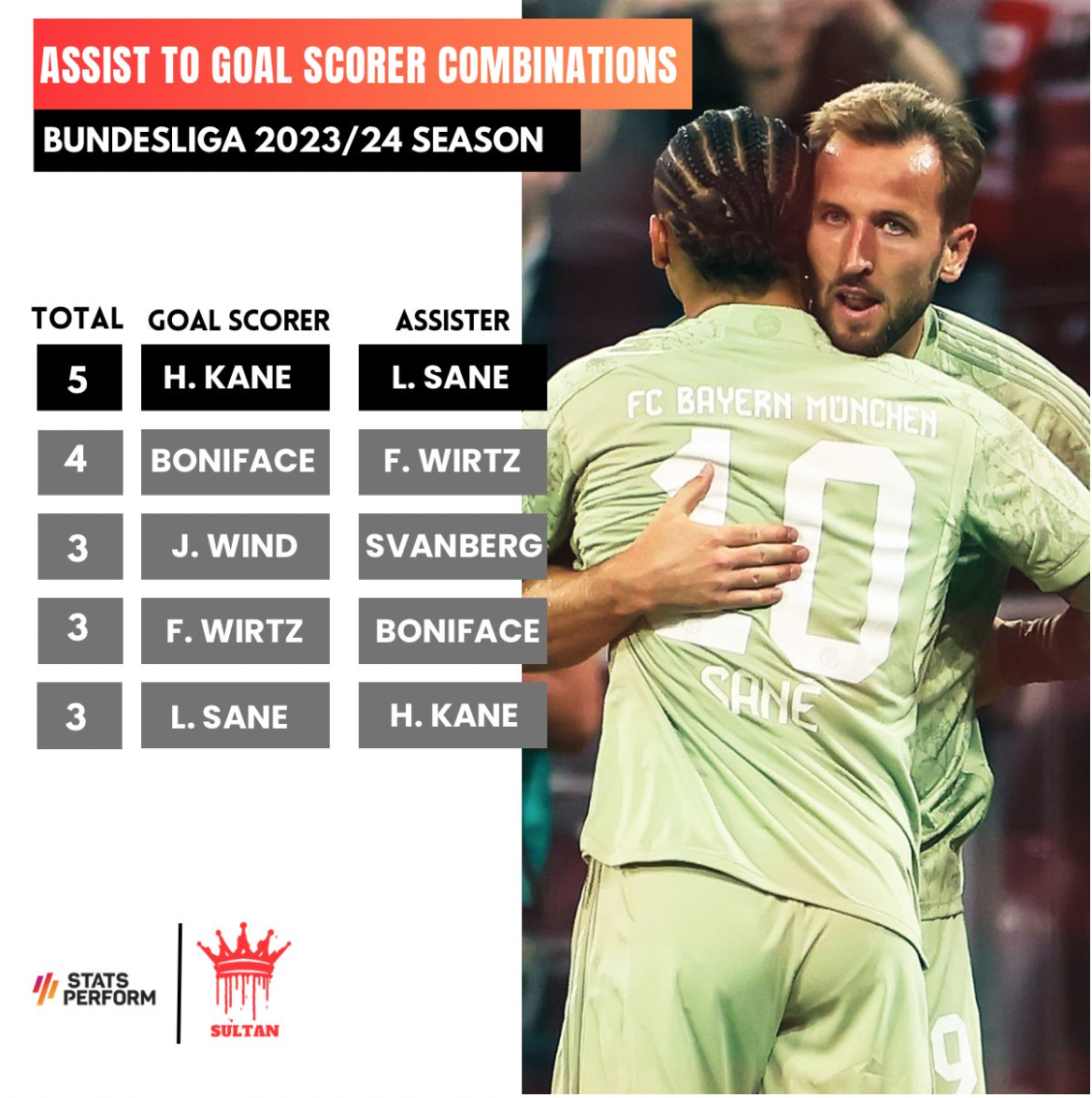
It is safe to say optimal attacking prowess hasn’t been Bayern’s problem this season, a lot of discussions have been raised about the midfield pivot of Goretzka-Kimmich, failing to steer the club to any big breakthrough over the years.
The Pivot
The double pivot of Kimmich-Goretzka has seen 3 different coaches out, with the latest being Thomas Tuchel. Accumulating some disappointing performances for both club and country, like two consecutive World Cup group stage exits with Germany and zero semifinals with Bayern Munich. The question arises; Is it the coaches or the players are not capable of playing at the highest level together? Several indications have been pointing to the latter.
Although Goretzka played his best football under Hansi Flick and was popularly termed the best box-to-box player, a physical phenomenon with abilities to apply his physicality and dominate duels on both ends, benefiting from Flick’s style which focused on minimal distance between the last defender and the No #9 of the team; lesser space to cover — more intensity applied. in other words, more front-foot pressing & less responsibility in the build-up. Also known for his box-crashing instincts with good timing on when and how to arrive into space to strike. He played a key role for club and country during this period.
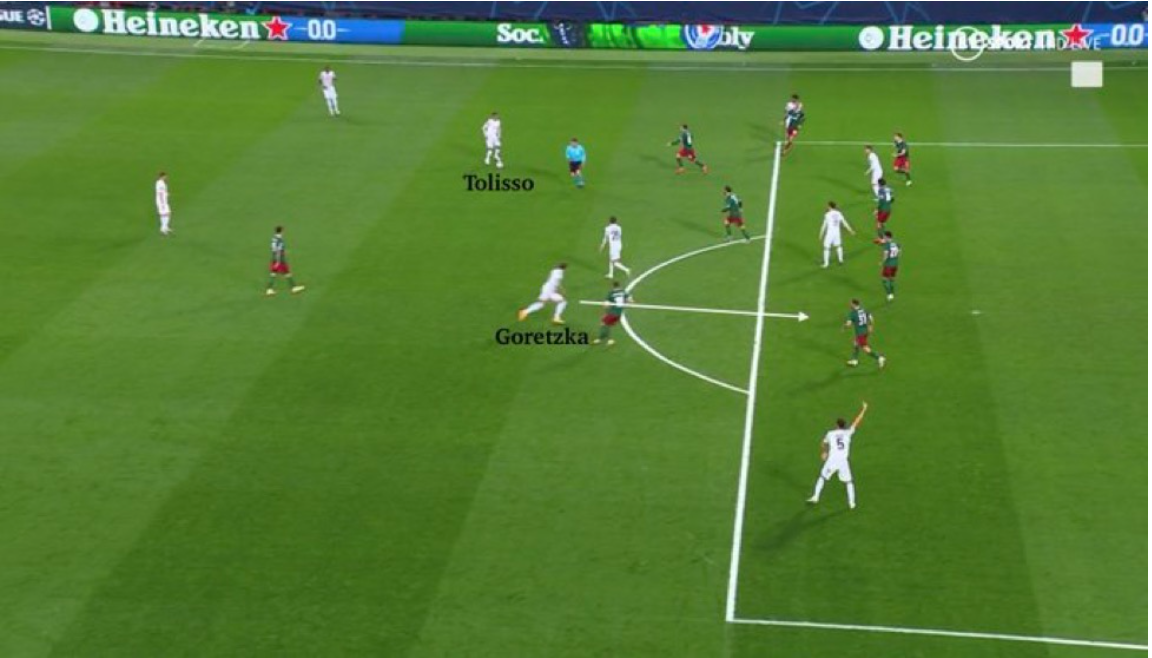
However, this later changed as the next coaches placed more emphasis on build-up, defensive cover and technical ability on the ball which isn’t Leon Goretzka’s biggest strengths. This marked the beginning of his drop in form that’d later translate to years of being average.
Joshua Kimmich on the other hand is one of the world’s best midfielders in the last 5 years, influential across many phases of play, and known for his renowned versatility to slot and dominate across various positions. However, many discussions have been raised on Kimmich’s ability to play as a #6 mainly because of his defensive abilities, whereas Joshua has publicly stated he is a #6 with the latest interview involving Thomas Tuchel.
Q: Thomas Tuchel still wants a #6
Joshua Kimmich: “I’m a #6!”
— Bayern & Germany (@iMiaSanMia) August 2, 2023
This has shown us over the months that it didn’t end here. The relationship between Tuchel and Kimmich has been affected greatly by this. Thomas Tuchel demanded for a new holding midfielder, while Kimmich sees himself in this role, Tuchel doesn’t and sees him more as a #8.
Tuchel is said to have ‘accused’ Kimmich of slowing down the game – a criticism that, although justified, does not strengthen Kimmich’s self-confidence. In Kimmich’s defense, he’s been placed with a lot of responsibilities in the current squad which limits the volume of his best actions.
Kimmich has been tasked to be the team’s main man in 1st phase build-up sequences, doing more of picking up balls from the goalkeeper from goal, receiving under pressure and progressing the ball and also providing defensive cover off the ball and in transitions, defending the large spaces behind and forcing turnovers. A scenario in pictures:
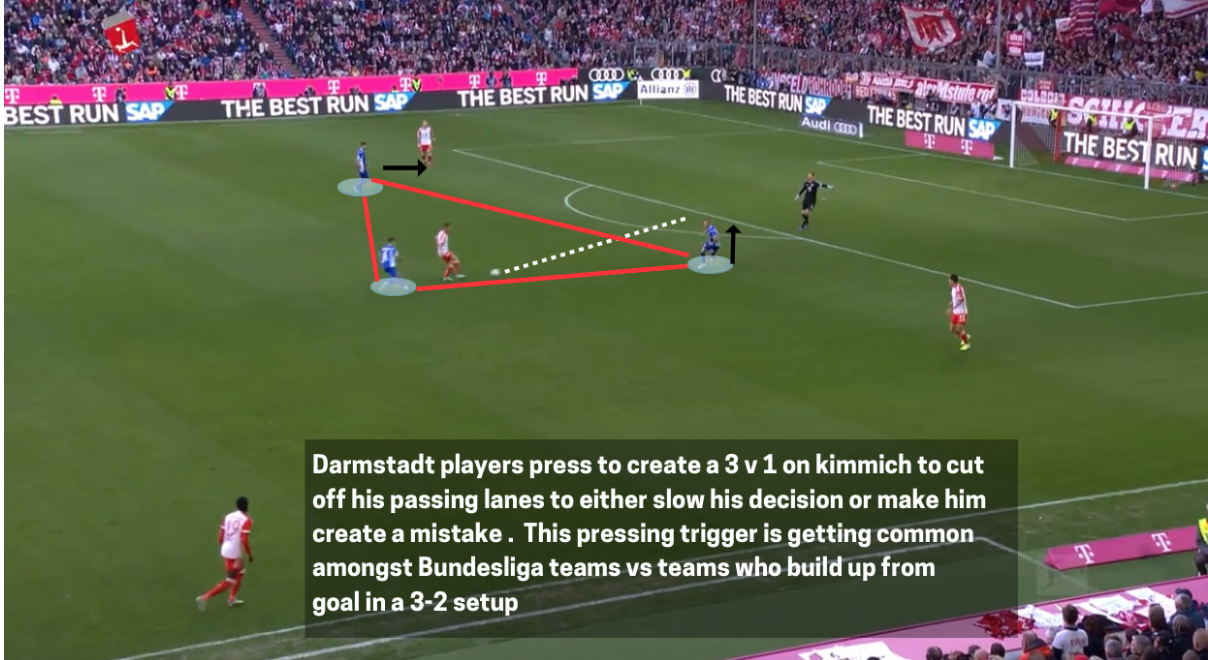
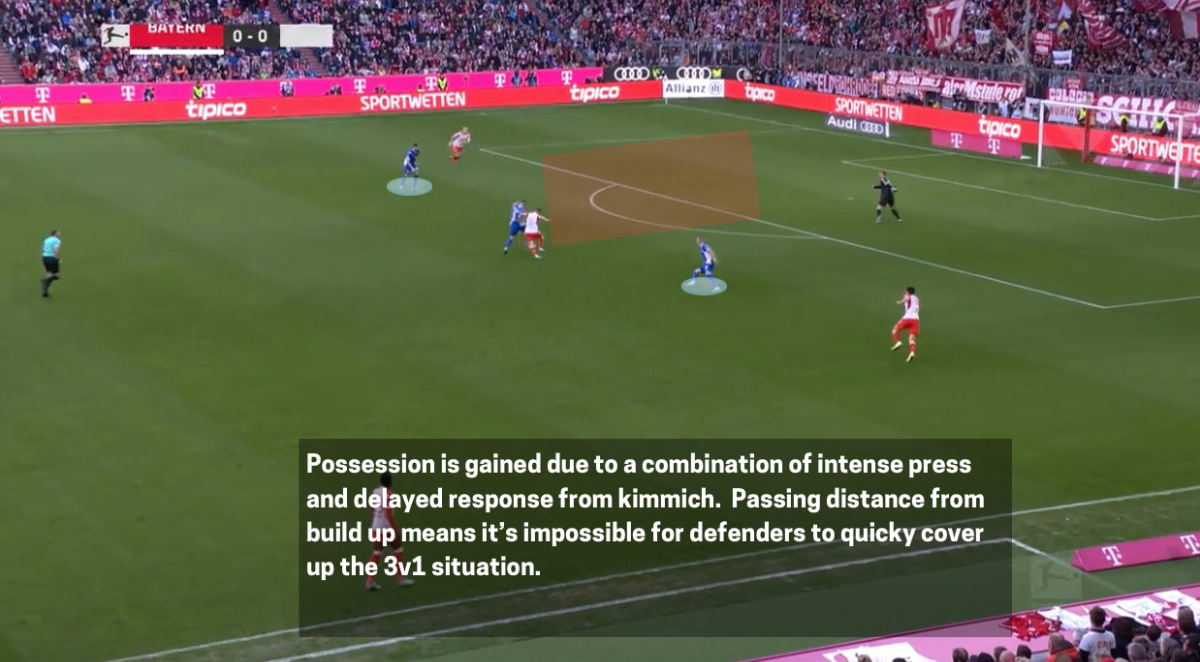
Bayern conceded a penalty from Kimmich’s tackle after losing possession to Darmstadt’s press that targeted him, and as a result, got sent off after. Many have sided with Tuchel’s claims and believe Kimmich’s best actions are higher up the pitch in the final third where he can apply his vision and perform a variety of actions that range from passes in-behind defenses, pin-point crosses or even starting attacking sequences.
Examples in big games like his assist in the Champions League final. Also, actions like ball strikes on goal with recent example against Frankfurt in the 5-1 defeat and also the goal against Roman Bürki in the title race as seen in the images below.
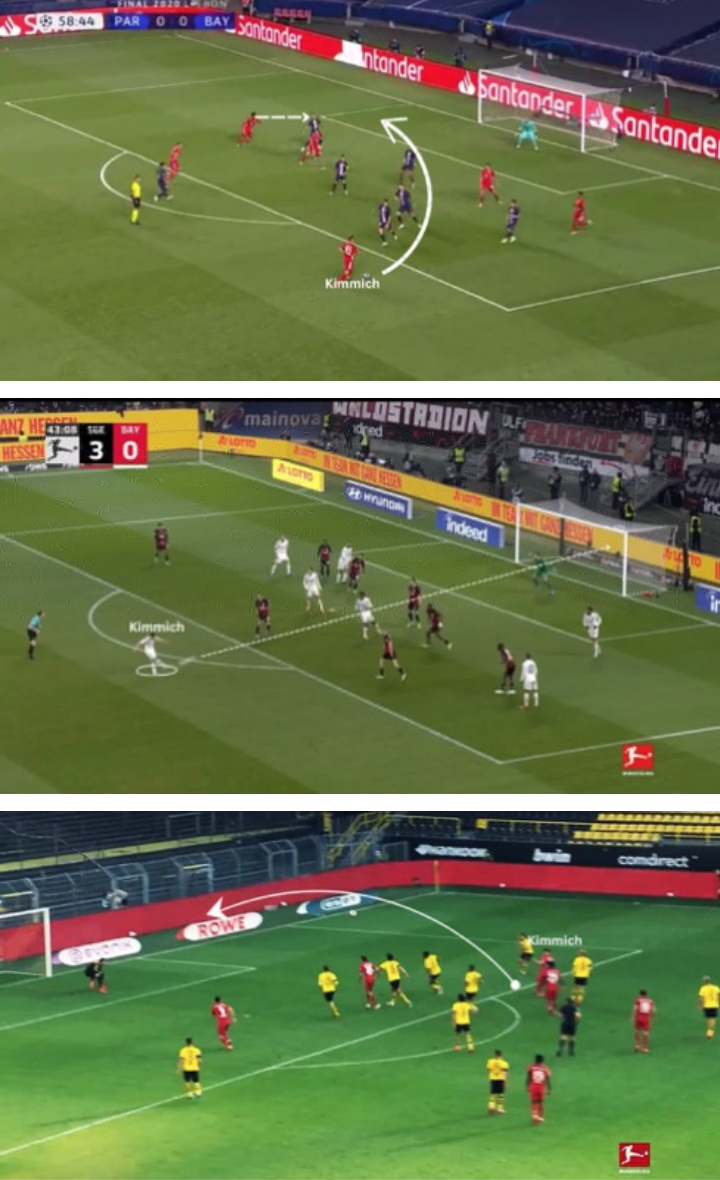
The 2023/24 season has seen a common trend of Kimmich being isolated in midfield, reviving zero support from Goretzka either in build-up or defending. In some games, the duo has been seen exchanging zero passes between each other; shocking. Goretzka can be said to have been accustomed to his roles under the previous coaches where he was given liberty to stay higher up the pitch and have his average position there. These are seen in games like Frankfurt in which they lost 5-1.
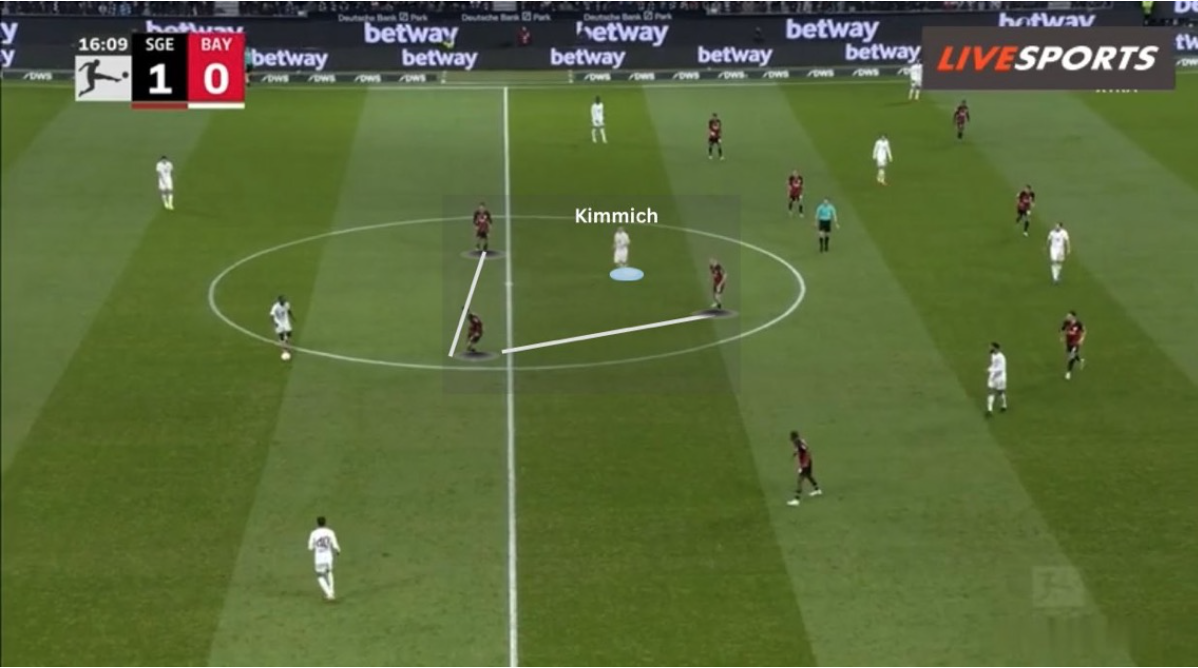
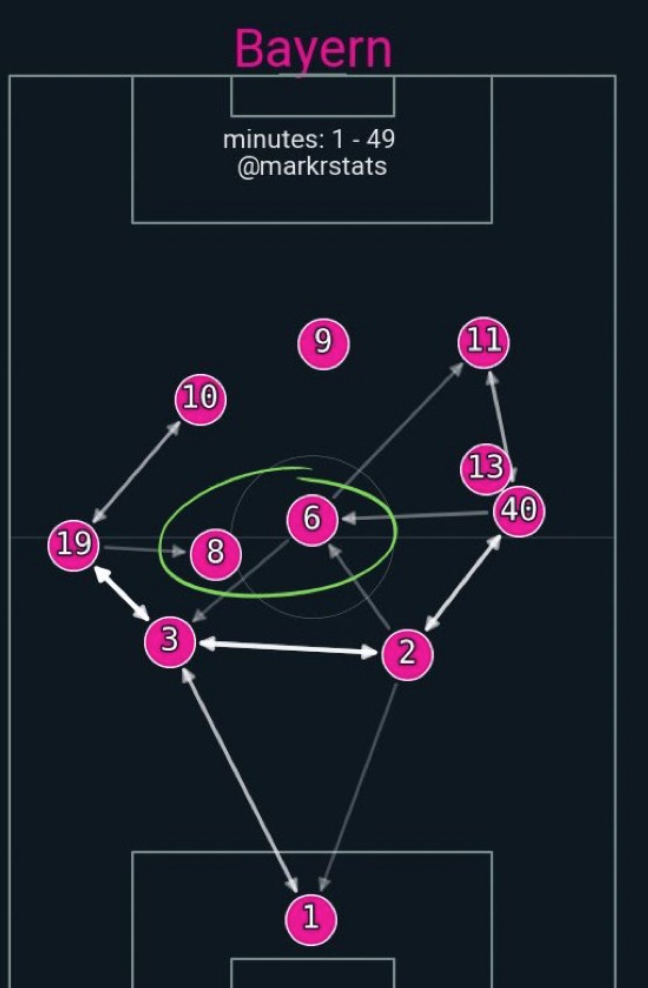
You start to wonder, are they really a double-pivot? On Kimmich’s dispute with Tuchel, several reports have indicated Kimmich had no future under Tuchel and the appointment of a new coach and a clear position definition, will make Kimmich find his old strength. Also, Bild reported the relationship between Thomas Tuchel and Joshua Kimmich was broken. The latest ‘episode’ was when Kimmich attacked one of Tuchel’s closest confidants Zsolt Lőw after Bochum’s game. Kimmich had already felt snubbed last summer because Tuchel’s main priority was to get a real holding midfielder who would be a boss on the pitch.
Dayot Upamecnao
Perhaps, the biggest letdown as regarded by many under Tuchel has been Dayot Upamecano, in the recent game against Lazio where Upamecano came in as a substitute and received a red card, Tuchel says: ‘We did everything we could to fall behind, making errors and losing confidence. (There was) no need for Upamecano to go in like that. It’s not wild or intentional – but just block the shot.’
When you look as far back as the previous season, in the games vs Manchester City, you’d discover it has been a recurring theme for Upamecano to make mistakes in the big games of the season, particularly in the Champions League. Ability issues or mentality? A popular question asked by many.
In terms of ability, Upamecano is one of the best center backs in the world, trusted by many coaches including the national team in which he’s featured for France in some of the biggest tournaments and games. His ball-playing abilities, line-breaking passes and aggressive approach to close down attacks are appreciated and a key reason he’s a priority pick for Tuchel, but is it worth the cost? Many Bayern fans have asked.
Tactical Outlook
One of the best matches under Tuchel came against Gladbach at the Allianz Arena, a team known to be Bayern’s biggest threat in the league, a team Bayern hasn’t beaten twice in a single season since 2016 under Carlo Ancelotti. Let’s take a look at how Tuchel set up his Bayern side despite the absence of his best midfielder. On the ball: the team builds up this way.
- 2 CBs (Dier-De Ligt) with the full-backs (Davies & Noussair Mazraoui) stretching out wide
- Midfield double pivot (Pavlovic-Goretzka) with the latter often dropping deep to collect off the CBs and Pavlovic staying in higher positions
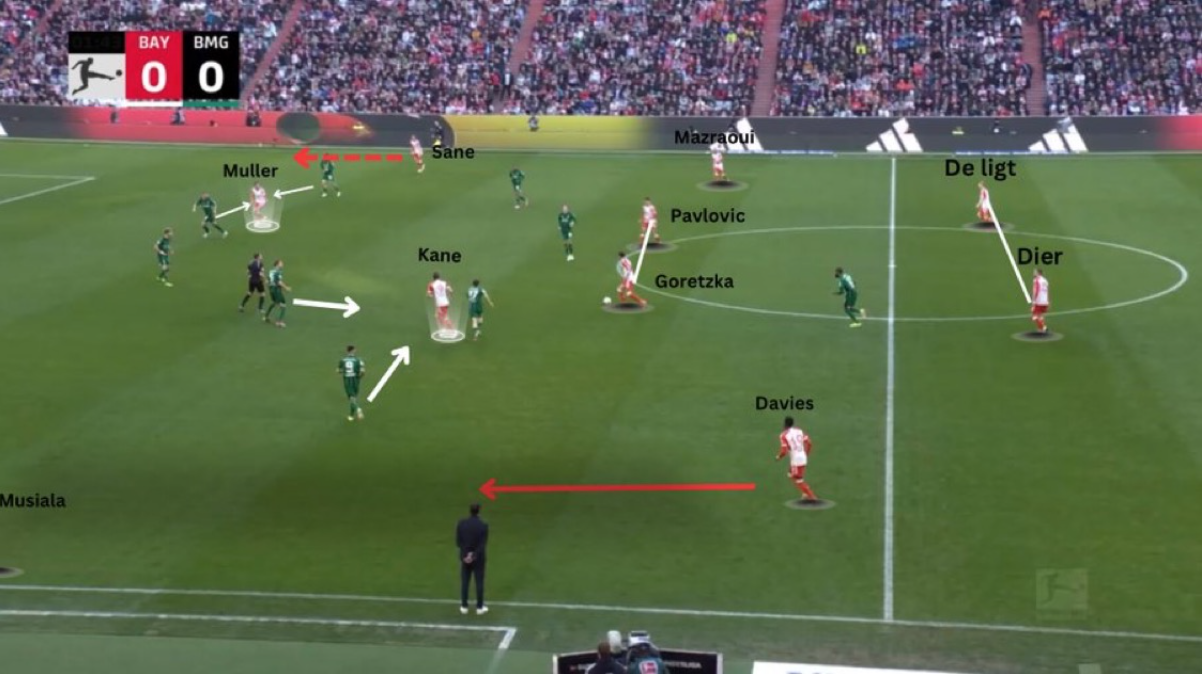
- Musiala & Sané stayed wide, maintaining position to stretch Gladbach’s compact shape.
- Müller floating between & across the lines, in-between Gladbach’s players (space is created for the wide & central players to run in)
- Kane as a nominal 9 was a key figure in the build up with his movements
- Drops into midfield to push Gladbach’s defense line forward & create a 3v1/4v1. That allows:
- Bayern to play direct through (Dier) vertical passes to Sané
- Bait Gladbach players to press
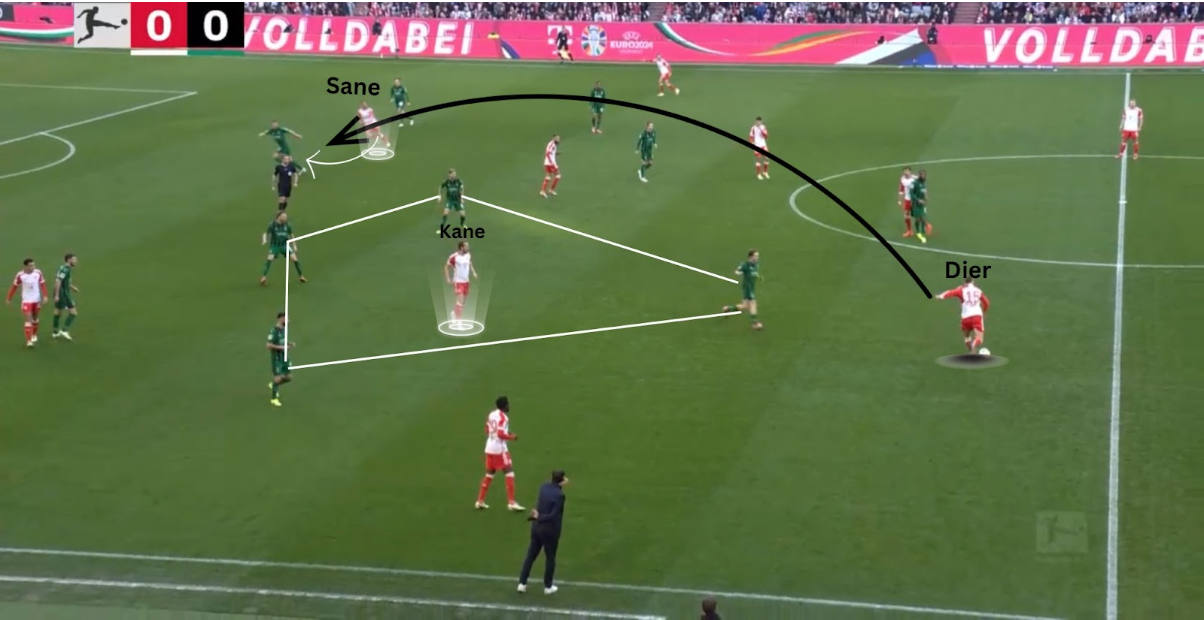
The image below shows Bayern’s setup to play direct (Long balls in behind to either Sané/Musiala)
- 3 CBs + central overload (Mazraoui given freedom to roam midfield)
- Press is easily bypassed
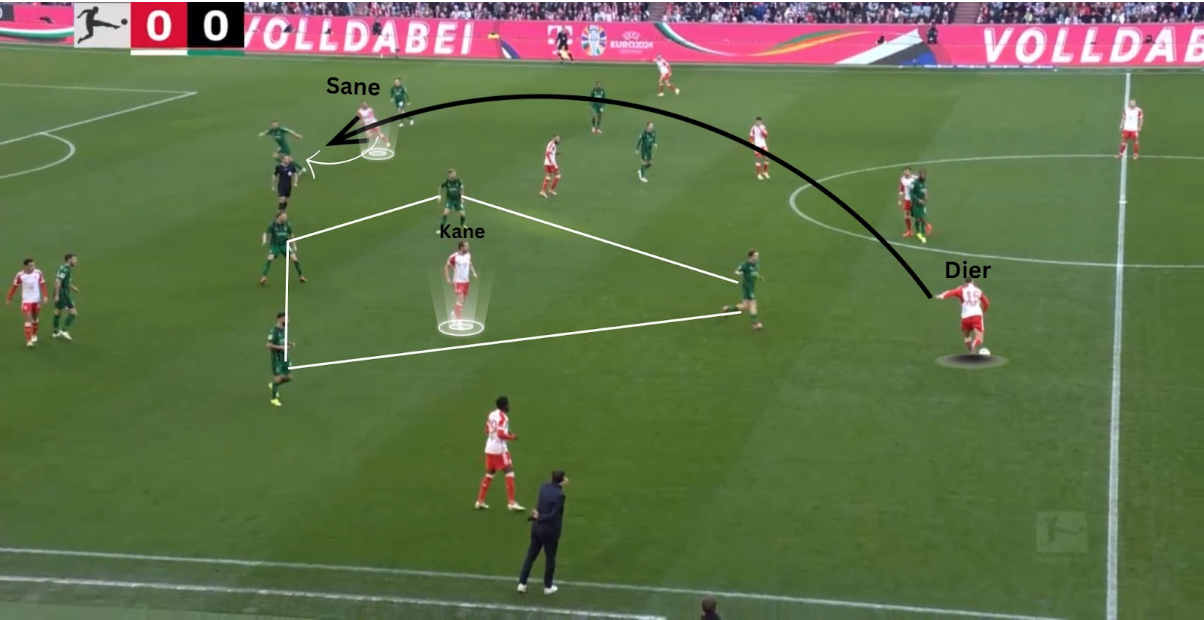
Off-the-ball – Tuchel’s shape turns to a 4-4-2
- Nullifies Gladbach’s best threat down the right (Franck Honorat) by pushing left sided midfielder & left back (Davies) wider.
- Denies access to find spaces or players (Manu Koné) between the lines for central progression
- Aggressive Front two (Kane & Musiala) press
- Midfield pivot keep compact shape on the same line
- Right winger (Sané) pushes deeper to defend the right side of the pitch
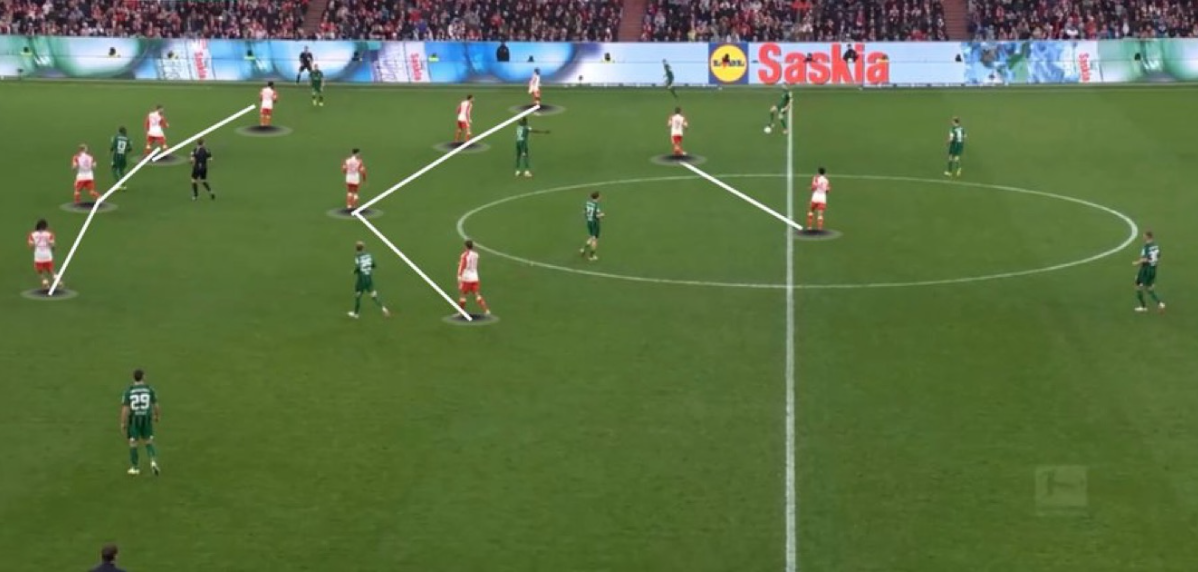
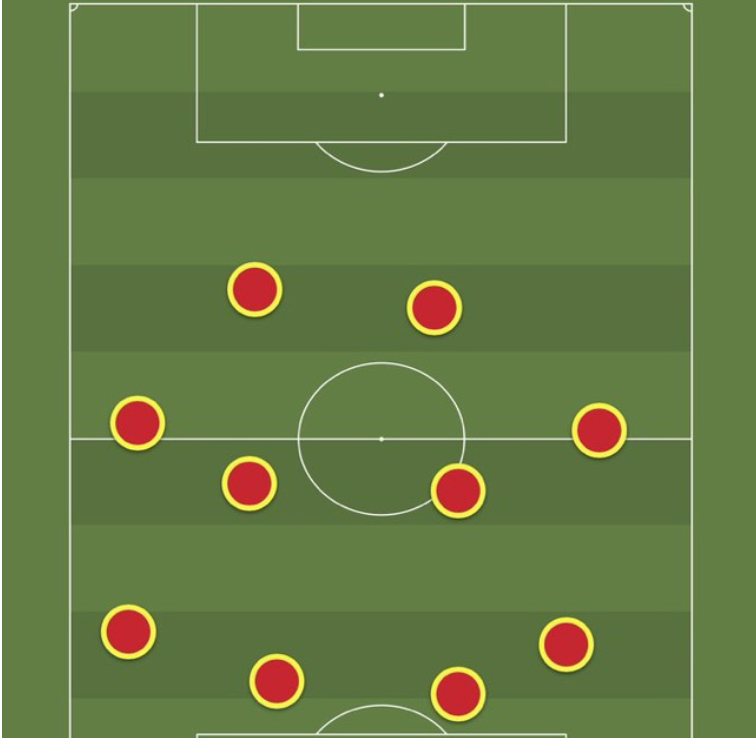
The structure allows the team absorb pressure—win the ball & rapidly transition to exploit spaces left by the Gladbach. Examples of counter attacks with four players dangerous in the final third & can generate threat (Kane, Sané , Muller, Musiala) in the images below.
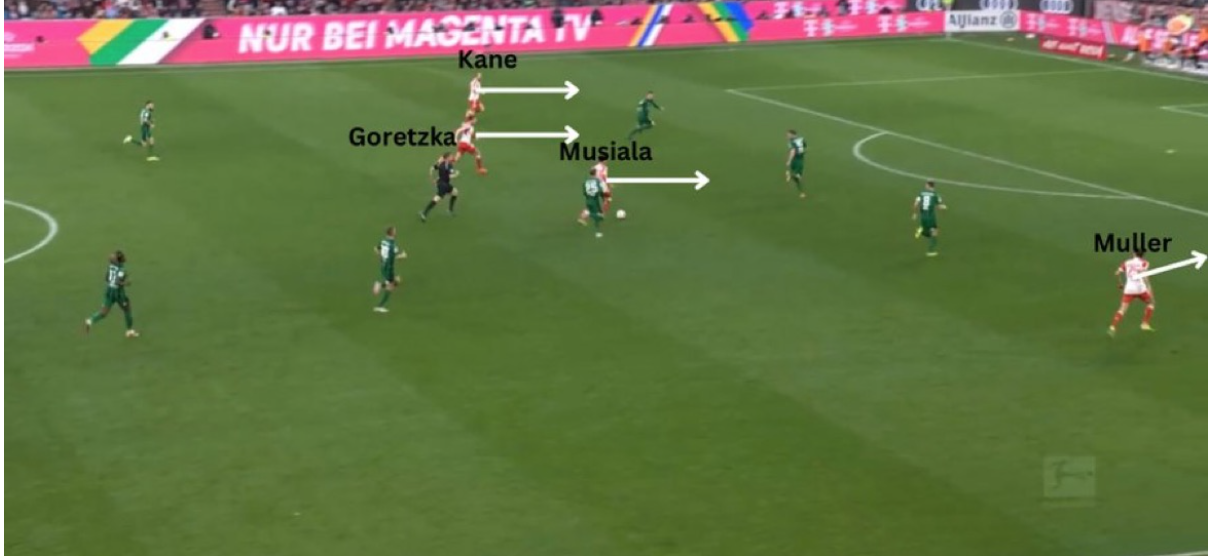
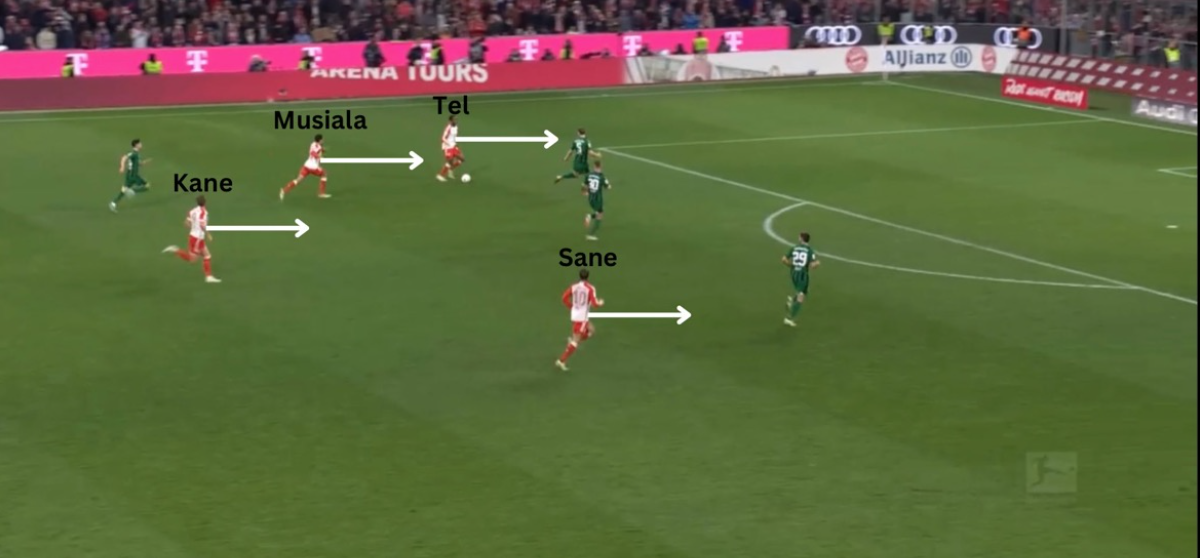
The proactive calculated high-press from Tuchel & the team to overload Gladbach’s right side was the best part of the game. Cutting passing lanes, man-marking denies them time and space on the ball. The possession is regained by Davies, switches to Muller to exploit the large gap on the left and makes a quick pass to Sané who couldn’t convert the chance.
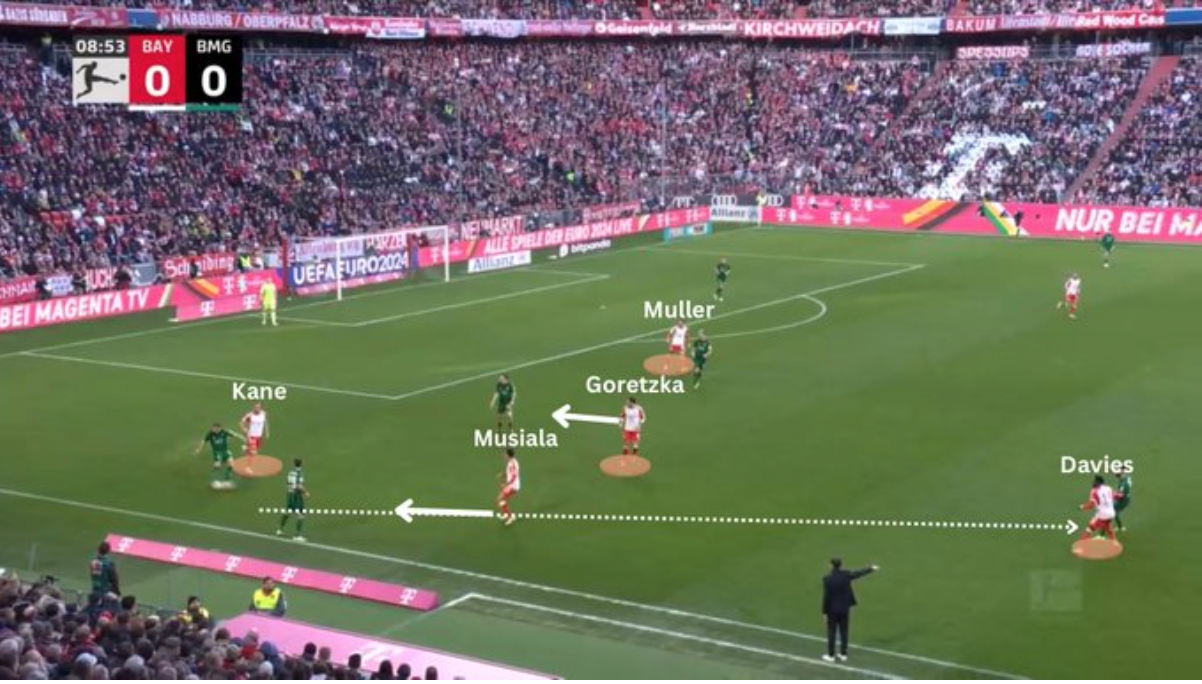
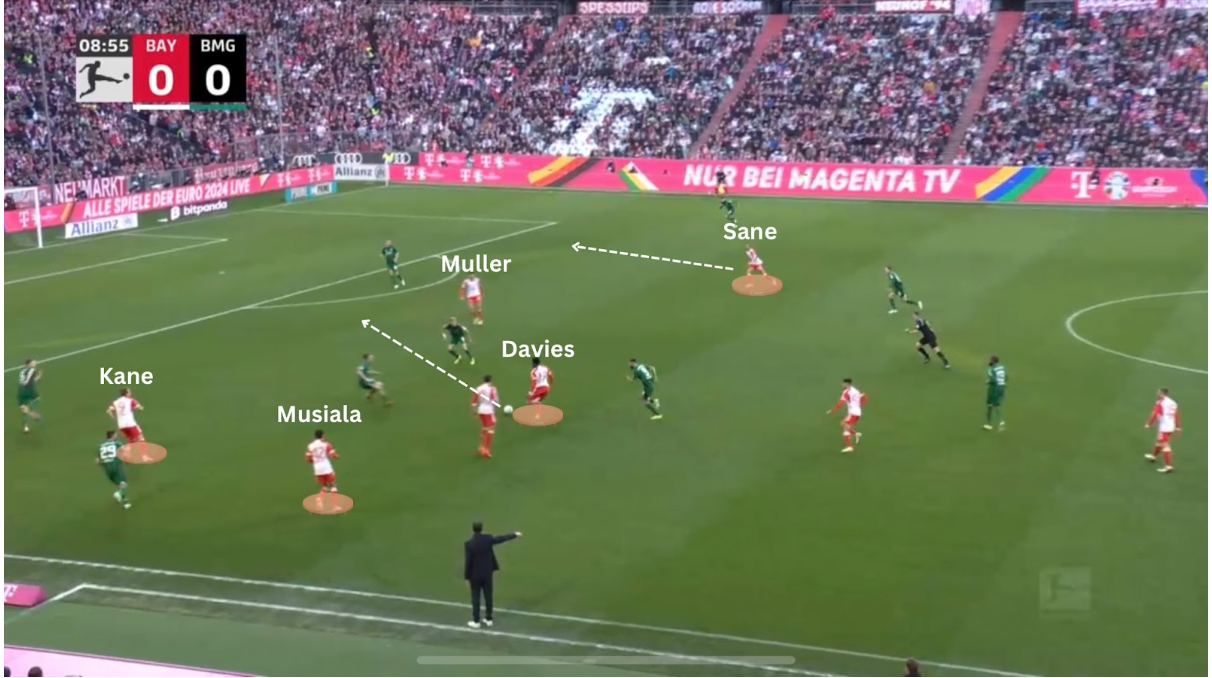
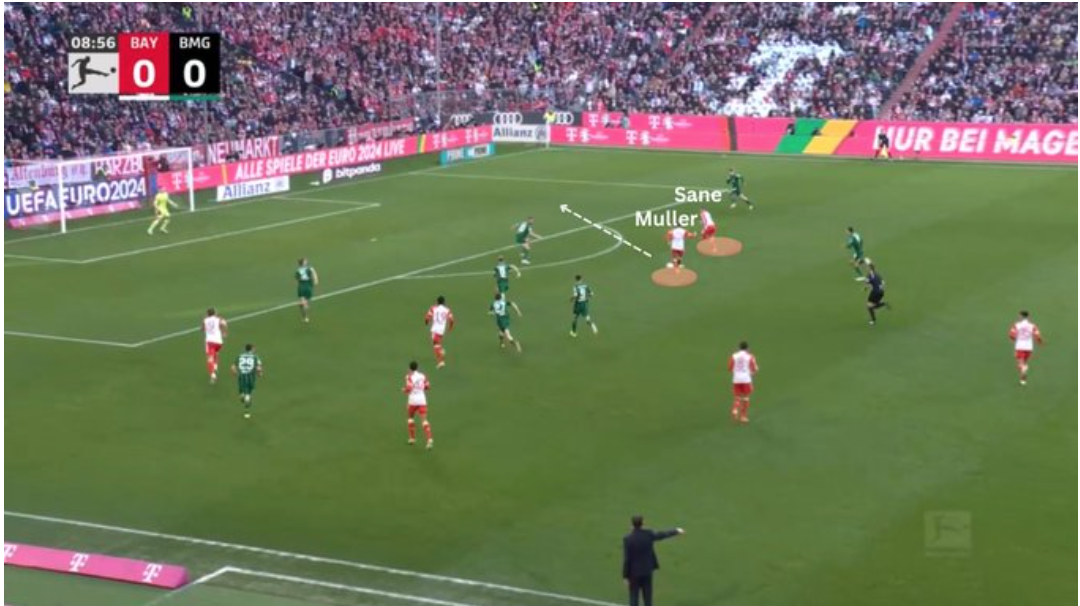
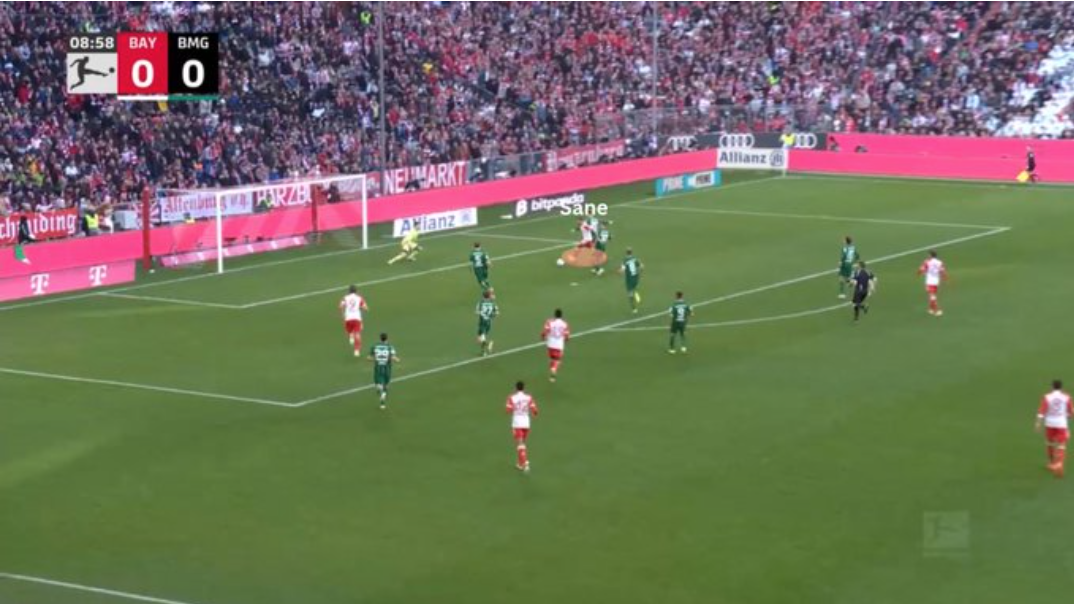
It was indeed a great win, coached by Tuchel after going a goal down, it sent a positive signal to Bayern fans and executives that the team is equipped with resilience and the mentality to turn games around. That seemed the case, ahead of the next game in what many referred to as a league-deciding game against the now league leaders Bayer Leverkusen.
Fast forward to the 10th of February, in what was the most anticipated game of the season between the ‘best’ team in the league led by the young Xabi Alonso and the current champion Bayern Munich led by the experienced & serial winner Thomas Tuchel.
The game ended 3-0, the scoreline doesn’t do justice as Bayern were completely outclassed defensively, mentally and most importantly on the table. Criticisms on Tuchel’s tactics were raised by the club’s bosses and Bayern fans as many claimed Tuchel was too ‘respectful’ to Alonso’s team to the extent of trying to mirror their formation, mismatching players like Sacha Boey in an unnatural position which ended up a failure.
The Bundesliga Team of Matchday 23, brought to you by @SofascoreINT.@vishnua711 on Schlotterbeck: https://t.co/fbxjCcwp4i@ZachLowy on Gosens: https://t.co/pyWLhYT9TR@XxAdamKhanxX on Andrich: https://t.co/Aa9VPbufA8 pic.twitter.com/w72vhkIrWh
— Breaking The Lines (@BTLvid) February 26, 2024
Alonso set up Leverkusen in a deep 5-2-3 out of possession which naturally provides them overloads during transition, wide defensive security and counter-pressing advantage from their vertical compactness making it hard to find space in between the lines & forcing Bayern into less favourable areas.
This proved the case as Bayern made lots of mistakes in possession, taking a lot of touches in their half or passes straight to the opposition. Progressing the ball into the second phase was also hard from distances between the players and midfielders not knowing how to pass the first & second line of pressure.
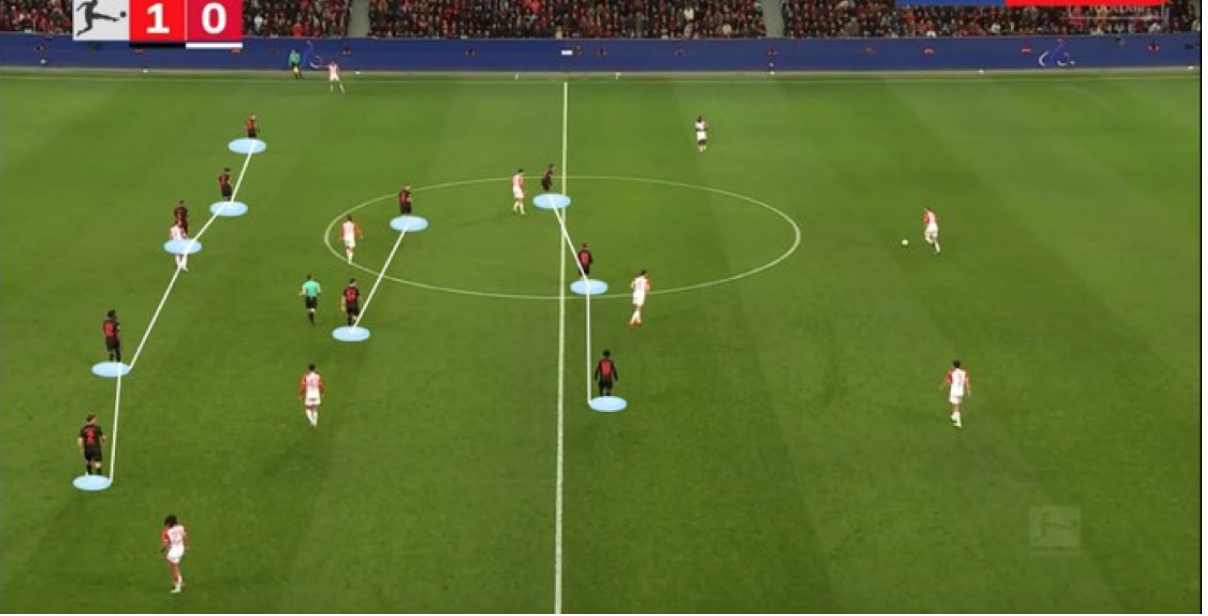
Leverkusen made the field narrow and the distances horizontally and vertically small, with a minimal gap between the last defender and the attackers.
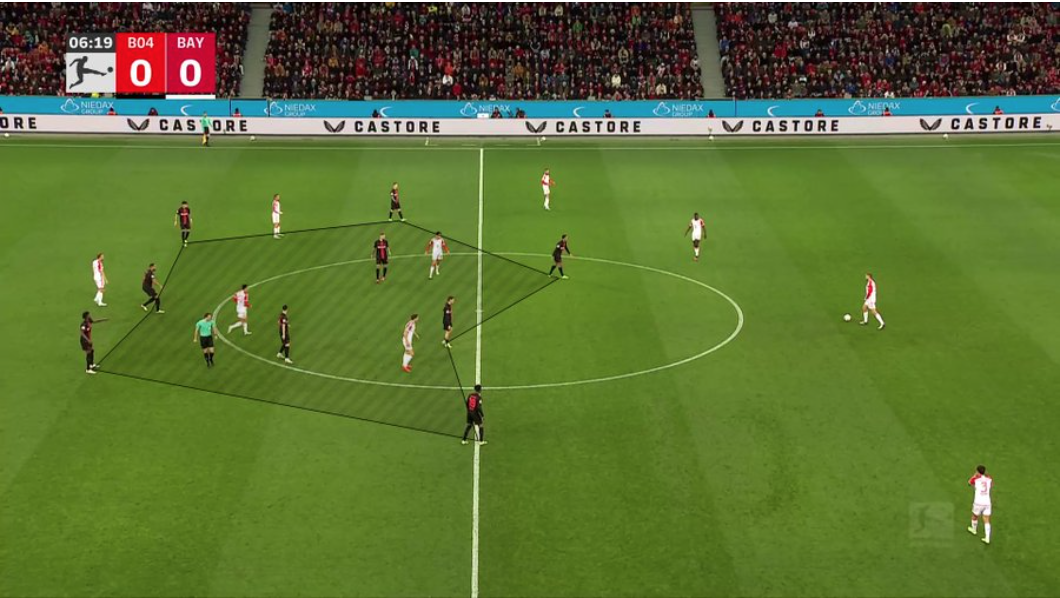
Goretzka-Pavlovic as the double pivot in the game was surrounded by Leverkusen players, making it hard to receive the ball from the central defenders, turn and progress to Bayern’s attackers. As a result of this, Dier is forced to go long and wide to Boey who was heavily marked by Stanisic, on loan from Bayern.
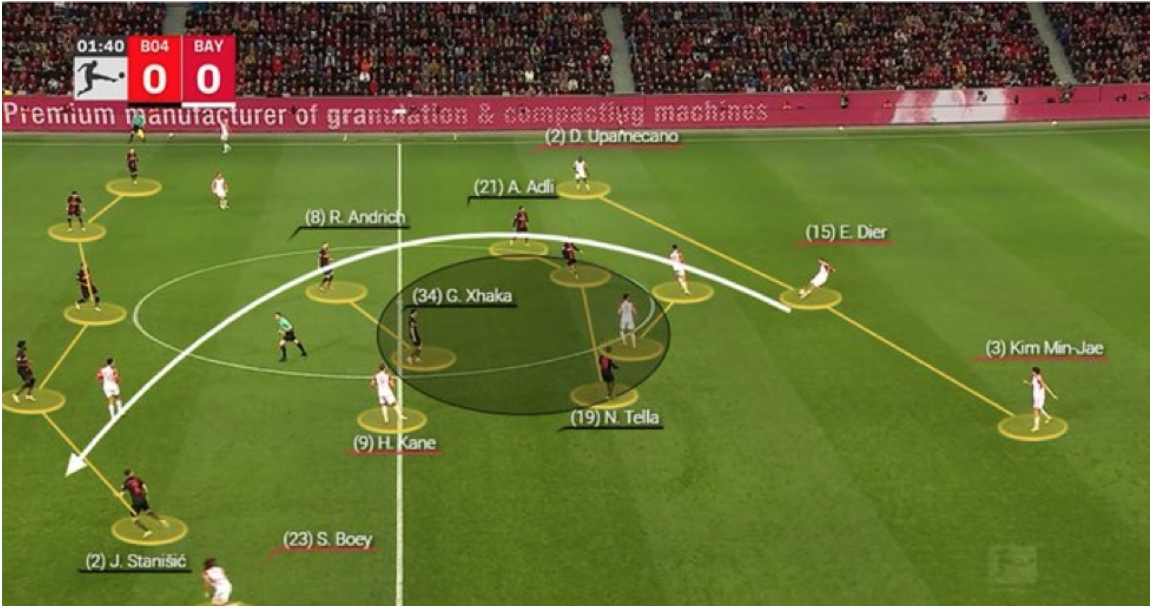
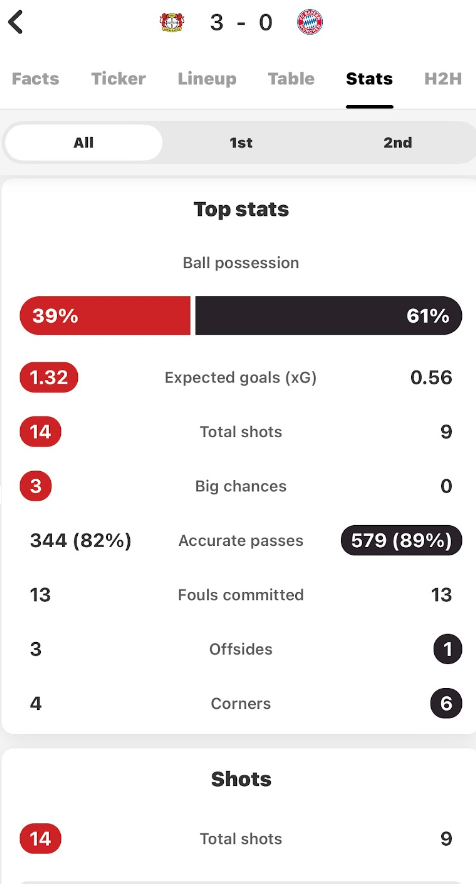
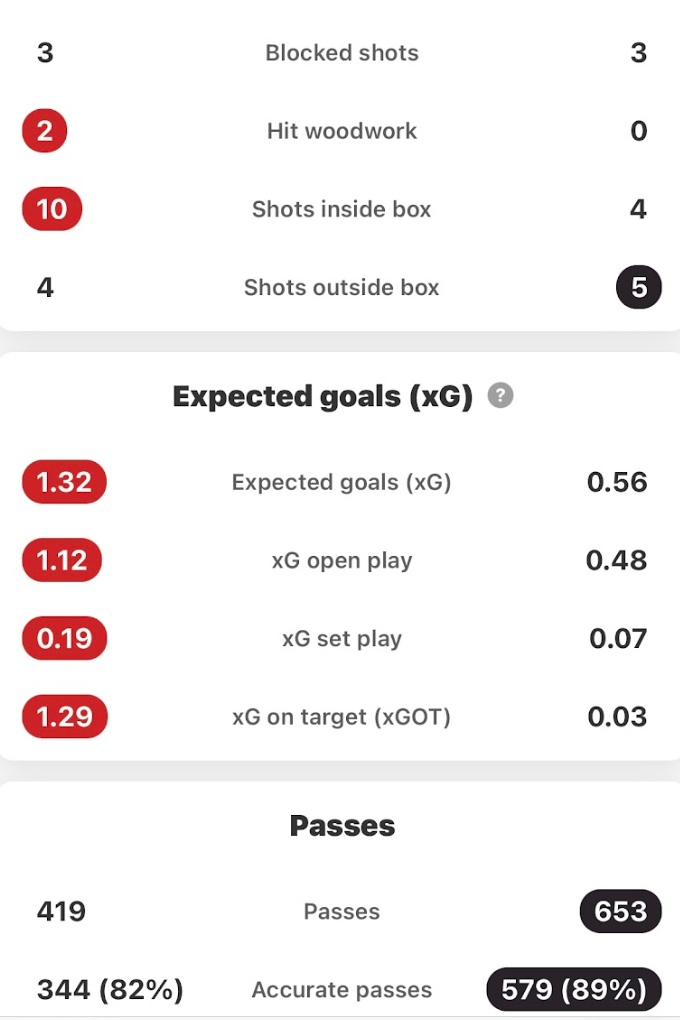
Bayern found no solution to the problem in the game. Players like Kimmich should have started the game as his passing range was needed desperately in the game.
“Tuchel: “I take responsibility for the tactical approach to the game and it goes without saying that I have to take the blame today. We had a whole week to prepare and it’s my job to come up with ideas and convince my players of that approach. Unfortunately, it didn’t quite come off today – it’s not the first time and won’t be the last in my coaching career.”
Away from the Leverkusen game, Tuchel and the team promised a reaction ahead of the trip to Rome in the match against Lazio in the Champions League Round of 16. Instead, the disappointment grew even further as the game ended in a 1-0 defeat to Bayern.
Bayern Munich have found their new right back with Galatasaray’s Sacha Boey. @shaunconnolly85 has the lowdown on the French defender: https://t.co/eNGH81hIXN pic.twitter.com/jC2hnqmqXD
— Breaking The Lines (@BTLvid) January 28, 2024
“The night after the game against Lazio in Rome, Thomas Tuchel sat with the club’s bosses and explained to them where the problems currently lie. Tuchel’s analysis was that the players don’t dare to take any risks, they only go for the safe option, preferring to pass the ball backward or sideways rather than boldly forward. That means there are no moments of surprise for the opponent and no 1v1 situations that players like Leroy Sané or Jamal Musiala need. As a result, the strengths of Harry Kane cannot be put to use, which led to only one shot on target in two games against Lazio and Leverkusen [cfbayern]”
The Media, Dressing Room and Fans
Thomas Tuchel has been a constant target from the media in the last few months, to the extent of ‘false’ news being generated by media outlets. Some referred to him as the biggest misunderstanding since Jürgen Klinsmann, direct criticisms of how he doesn’t fit at Bayern and how he has messed up with the club’s leadership. The most recent is a Sky Sports reporter Riccardo Basile quotes a ‘source from the team circle’, according to which, Thomas Tuchel is said to have told his players in the dressing room after the game against Leverkusen: “You are not as good as I thought, then I just have to adapt to your level”.
The above claim appeared to be false and a motivated attack, Tuchel usually gives his internal speeches after games in English – also after the 3-0 defeat in Leverkusen. On the other hand, the words that he had already chosen several times were: ‘You are not yet at the level at which I would like to see you.’ – There’s a big difference between the two statements.
In the summer of 2005, Borussia Dortmund found themselves on the brink after accumulating debts of over €200m after missing out on the Champions League in back-to-back years.
They turned to Bayern Munich, who gave them a €2 million loan to help cover one month’s payroll. pic.twitter.com/zCBvgPeUqd
— Breaking The Lines (@BTLvid) July 28, 2023
“Thomas Tuchel says “limits were crossed” about the criticism he got following his statements about working in Spain at the fan club. On Didi Hamann’s apology, Tuchel says: “I don’t care whether he apologised or not. I’m not buying it from him. ‘When the team arrived to training, a group of fans held ‘Tuchel out’ banners in front of the coach’s car and were sent away by security. Other banners were saying why Matthijs de Ligt isn’t playing’ [vcatalina96]
Also, amongst the players, there have been reports of a divided atmosphere in which some certain players are not behind Thomas Tuchel being the coach anymore. Notably, players like de ligt whose future have been constantly questions due to lack of playing time and not being trusted by the coach and youngsters like Mathys Tel losing faith in Tuchel who hadn’t trusted to give him a Bundesliga start in the 21 match days played so far despite performing and sometimes being the best players off the bench.
“Players still behind Thomas Tuchel: Manuel Neuer, Raphael Guerreiro, Jamal Musiala, Leroy Sané, Harry Kane, Eric Dier
- Players against Thomas Tuchel: Joshua Kimmich, Leon Goretzka, Thomas Müller, Matthijs de Ligt, Mathys Tel, Serge Gnabry” (BILD)
What Does the Future Hold for Bayern?
In a new exclusive news released by the club, Bayern Munich and head coach Thomas Tuchel decided to part ways at the end of the season. The decision comes after the 50-year-old’s side fell to a 3-2 loss at Bochum in the Bundesliga — they would follow that up by narrowly edging Leipzig 2-1 via a brace from Kane. The club say an “amicable conversation” took place to “end the collaboration” with Tuchel’s contract set to expire in June.
“CEO Jan-Christian Dreesen said: “In an open, good conversation we came to the decision to mutually end our collaboration in the summer. Our goal is to carry out a sporting realignment with a new coach for the 2024/25 season. Until then, every individual in the club is expressly challenged to achieve the maximum possible in the Champions League and the Bundesliga. I also explicitly hold the team responsible”.
Tuchel said: “We have agreed that we will end our collaboration after this season. Until then, I and my coaching team will of course continue to do everything we can to ensure maximum success.”
The decision was expected by many, following the lack of clarity in terms of progress on and off the pitch under Tuchel. Internally, there’s talk of too many big, well-paid personalities having lost their hunger. But every single player has lost form and confidence in recent weeks, which brings Tuchel’s role into sharp relief once more.
It should be said Tuchel is unlucky to club in a period when Bayern are reaping the rewards of the poor squad planning and internal politics over the years. Regarded as an unsung hero by many for exposing the presence of ego shared amongst numerous players without translating that on the pitch. That raises the question, is sacking Thomas Tuchel the answer? Will another coach get the best of this squad? Will another coach go through the same phase Tuchel went through from the hands of the unwilling and unmotivated players? OR Bayern goes through a major rebuild and replace certain players on high wages and large egos?
By: Sultan Babajide
Featured Image: @GabFoligno / Alexander Hassenstein / Getty Images
